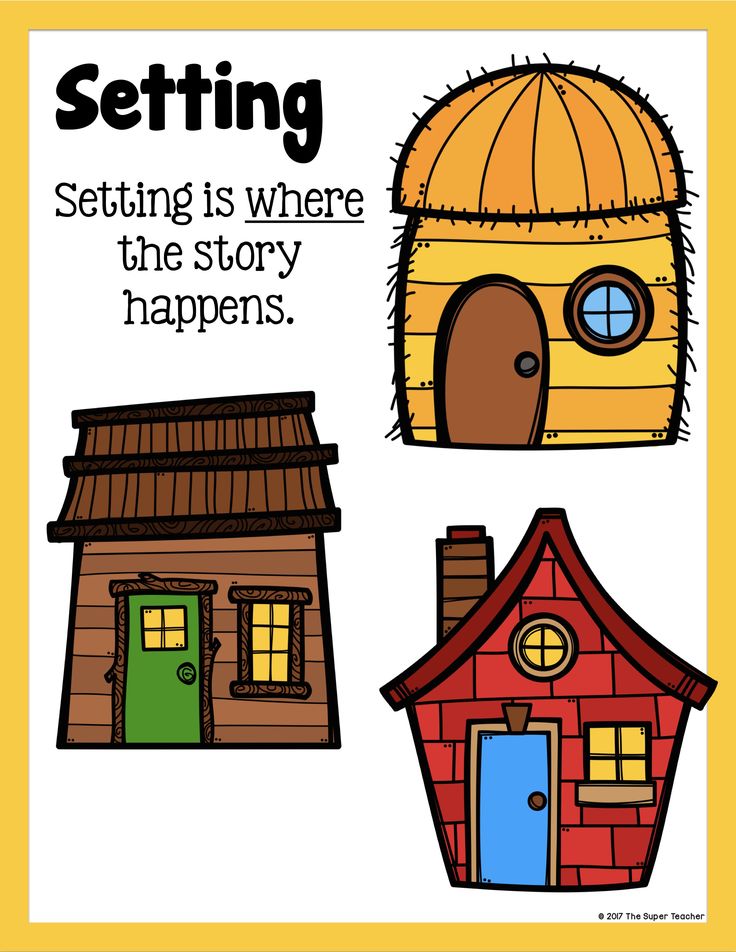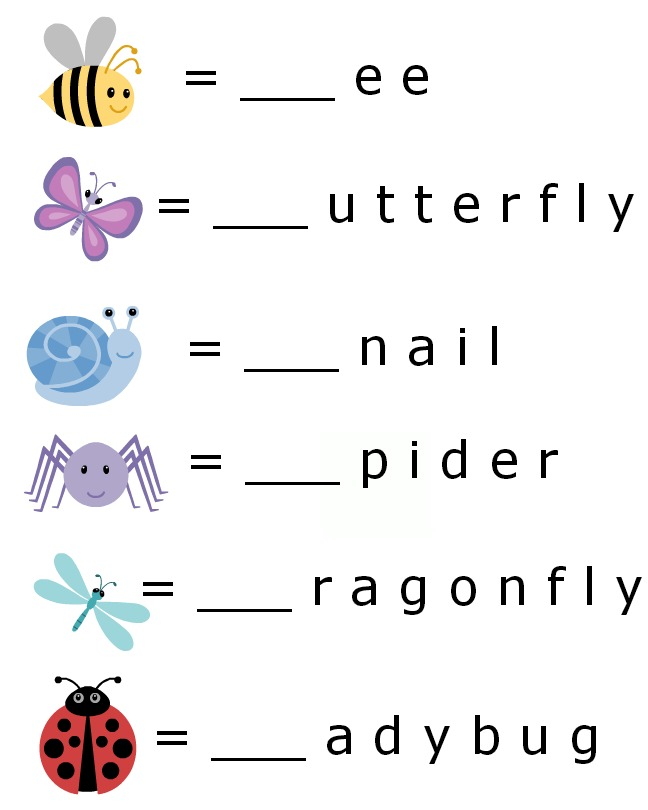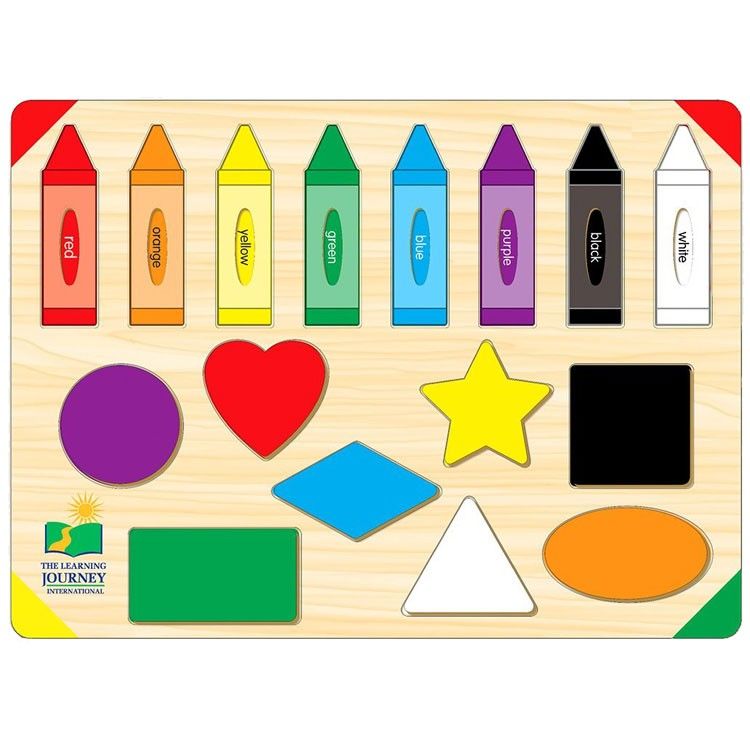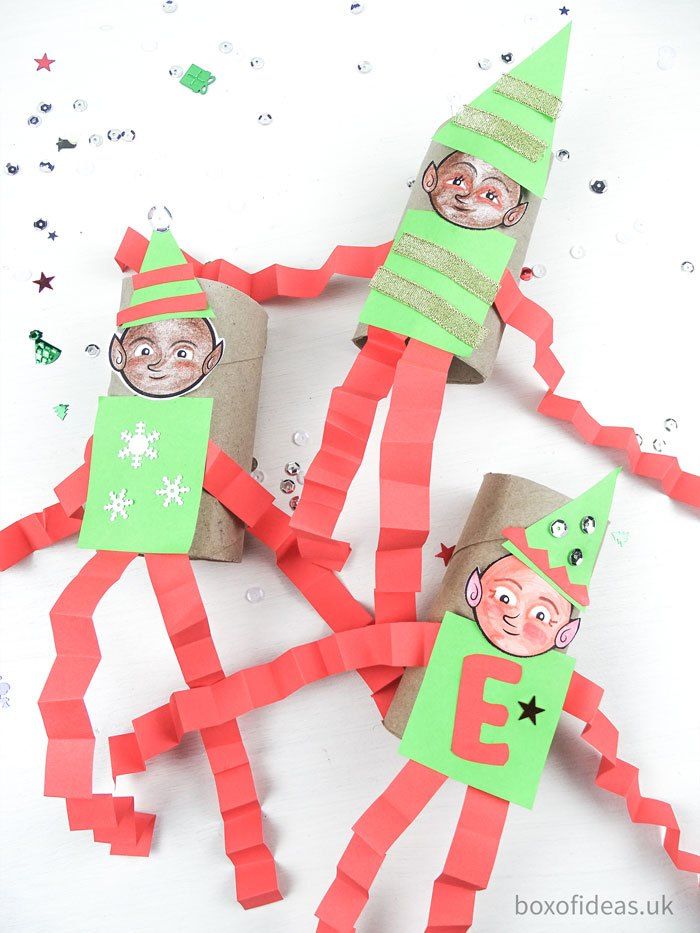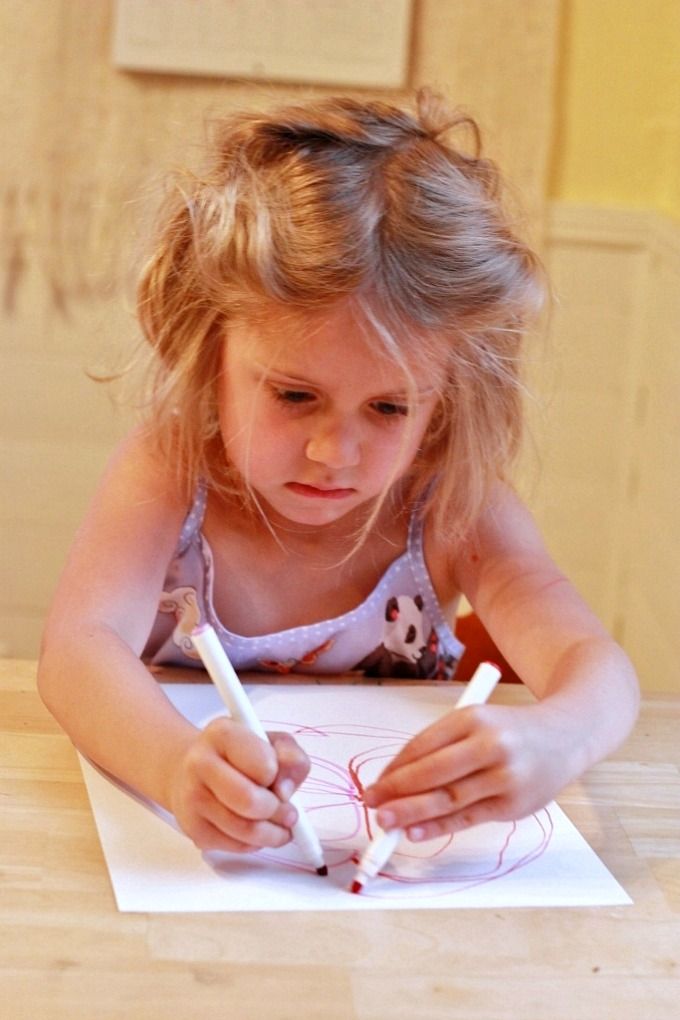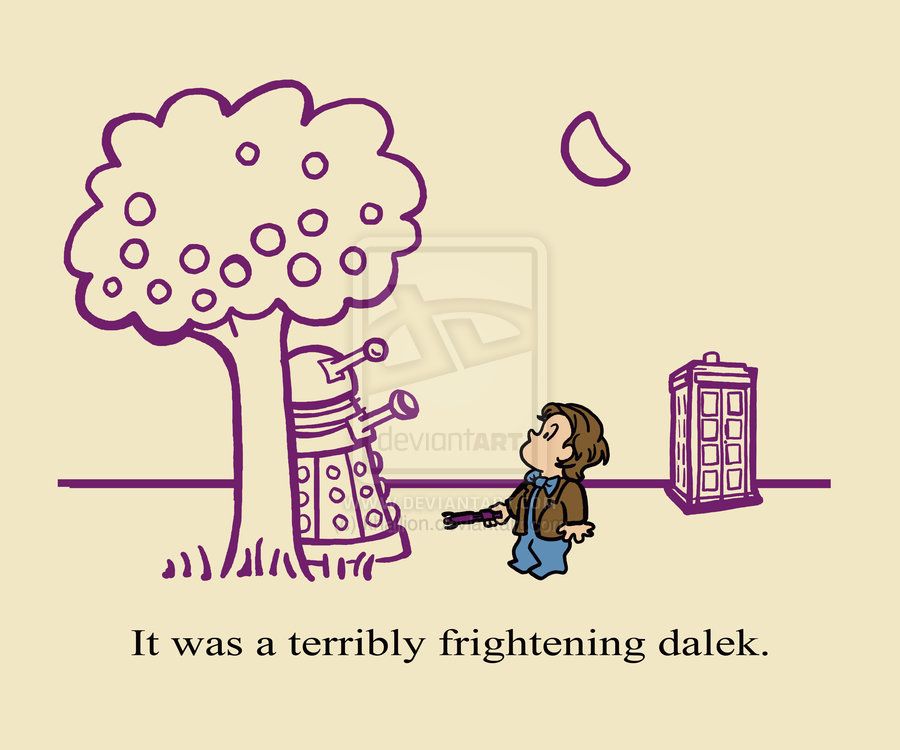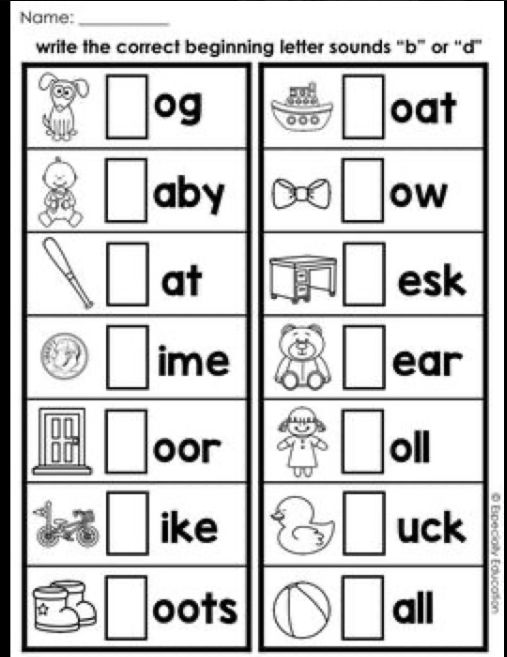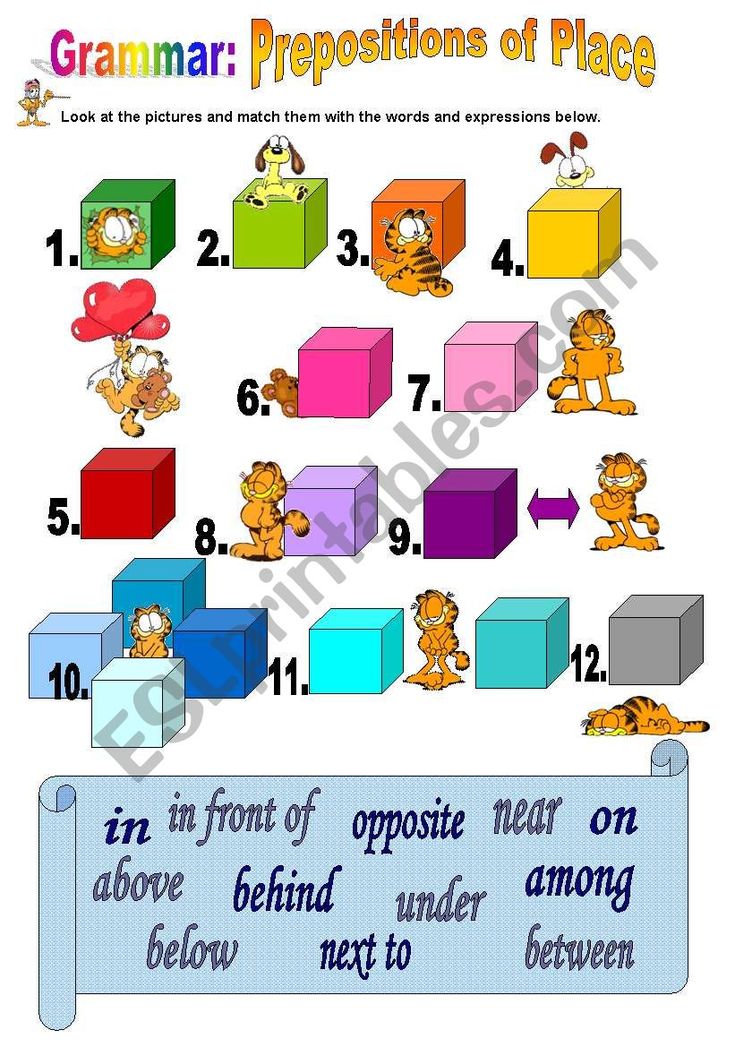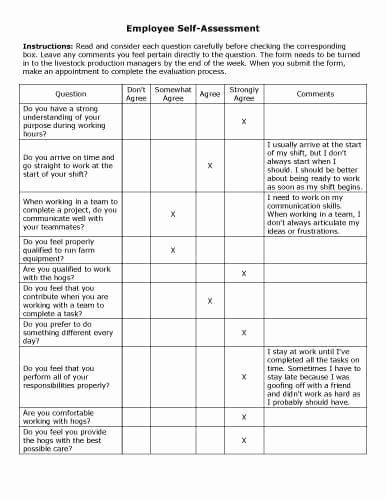Traditional three little pigs story
Three Little Pigs and other Folktales of Type 124
Three Little Pigs and other Folktales of Type 124and other folktales of Aarne-Thompson-Uther type 124
edited by
D. L. Ashliman
© 1999-2008
- The Story of the Three Little Pigs (England).
- The Three Little Pigs (England).
- The Fox and the Pixies (England).
- The Fox and the Geese (England).
- The Awful Fate of Mr. Wolf (African-American, Joel Chandler Harris).
- The Story of the Pigs (African-American, Joel Chandler Harris).
- How Come the Pigs Can See the Wind (North Carolina, USA).
- Little Pig and Wolf (Virginia, USA).
- The Three Goslings (Italy).
- Links to related tales.
Return to D. L. Ashliman's folktexts, a library of folktales, folklore, fairy tales, and mythology.
England
| Once upon a time when pigs spoke rhyme |
There was an old sow with three little pigs, and as she had not enough to keep them, she sent them out to seek their fortune. The first that went off met a man with a bundle of straw, and said to him, "Please, man, give me that straw to build me a house." Which the man did, and the little pig built a house with it.
Presently came along a wolf, and knocked at the door, and said, "Little pig, little pig, let me come in."
To which the pig answered, "No, no, by the hair of my chiny chin chin."
The wolf then answered to that, "Then I'll huff, and I'll puff, and I'll blow your house in." So he huffed, and he puffed, and he blew his house in, and ate up the little pig.
The second little pig met a man with a bundle of furze [sticks], and said, "Please, man, give me that furze to build a house." Which the man did, and the pig built his house.
Then along came the wolf, and said, "Little pig, little pig, let me come in."
"No, no, by the hair of my chiny chin chin."
"Then I'll puff, and I'll huff, and I'll blow your house in." So he huffed, and he puffed, and he puffed, and he huffed, and at last he blew the house down, and he ate up the little pig.
The third little pig met a man with a load of bricks, and said, "Please, man, give me those bricks to build a house with." So the man gave him the bricks, and he built his house with them.
So the wolf came, as he did to the other little pigs, and said, "Little pig, little pig, let me come in."
"No, no, by the hair of my chiny chin chin."
"Then I'll huff, and I'll puff, and I'll blow your house in."
Well, he huffed, and he puffed, and he huffed and he puffed, and he puffed and huffed; but he could not get the house down. When he found that he could not, with all his huffing and puffing, blow the house down, he said, "Little pig, I know where there is a nice field of turnips."
"Where?" said the little pig.
"Oh, in Mr. Smith's home field, and if you will be ready tomorrow morning I will call for you, and we will go together and get some for dinner."
"Very well," said the little pig, "I will be ready. What time do you mean to go?"
"Oh, at six o'clock.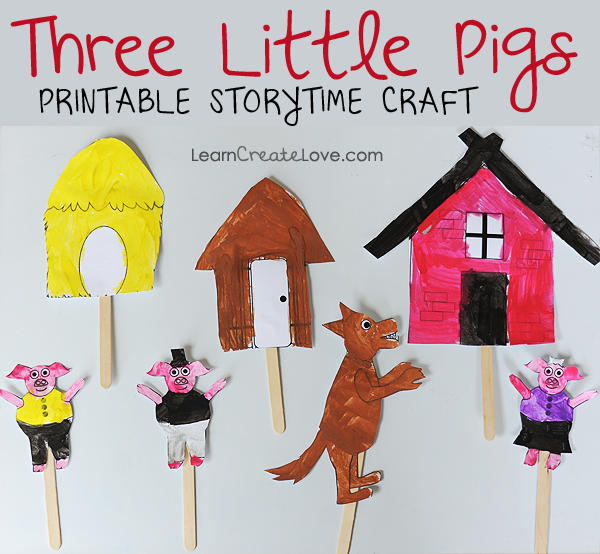 "
"
Well, the little pig got up at five, and got the turnips before the wolf came (which he did about six) and who said, "Little pig, are you ready?"
The little pig said, "Ready! I have been and come back again, and got a nice potful for dinner."
The wolf felt very angry at this, but thought that he would be up to the little pig somehow or other, so he said, "Little pig, I know where there is a nice apple tree."
"Where?" said the pig.
"Down at Merry Garden," replied the wolf, "and if you will not deceive me I will come for you, at five o'clock tomorrow and get some apples."
Well, the little pig bustled up the next morning at four o'clock, and went off for the apples, hoping to get back before the wolf came; but he had further to go, and had to climb the tree, so that just as he was coming down from it, he saw the wolf coming, which, as you may suppose, frightened him very much.
When the wolf came up he said, "Little pig, what! Are you here before me? Are they nice apples?"
"Yes, very," said the little pig.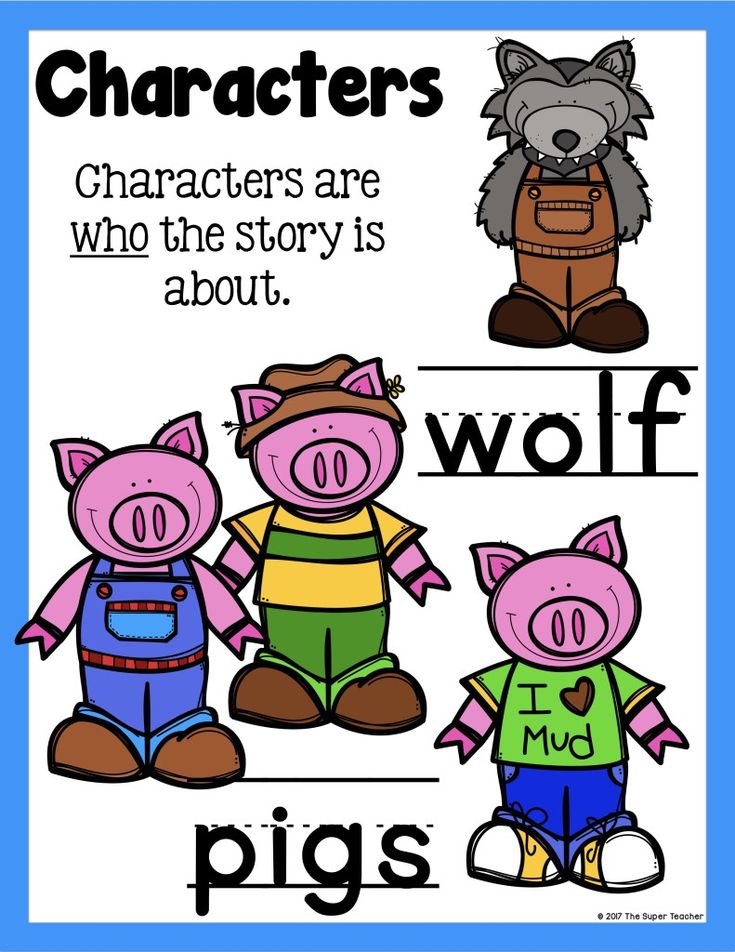 "I will throw you down one." And he threw it so far, that, while the wolf was gone to pick it up, the little pig jumped down and ran home.
"I will throw you down one." And he threw it so far, that, while the wolf was gone to pick it up, the little pig jumped down and ran home.
The next day the wolf came again, and said to the little pig, "Little pig, there is a fair at Shanklin this afternoon. Will you go?"
"Oh yes," said the pig, "I will go. What time shall you be ready?"
"At three," said the wolf. So the little pig went off before the time as usual, and got to the fair, and bought a butter churn, which he was going home with, when he saw the wolf coming. Then he could not tell what to do. So he got into the churn to hide, and by so doing turned it around, and it rolled down the hill with the pig in it, which frightened the wolf so much, that he ran home without going to the fair. He went to the pig's house, and told him how frightened he had been by a great round thing which came down the hill past him.
Then the little pig said, "Ha, I frightened you, then. I had been to the fair and bought a butter churn, and when I saw you, I got into it, and rolled down the hill.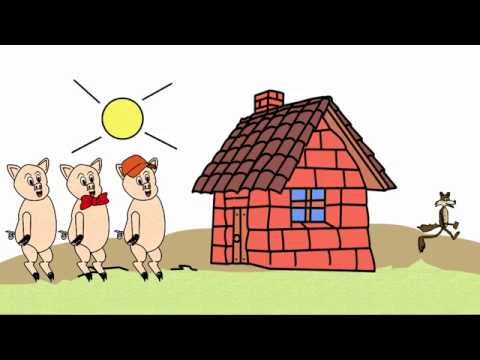 "
"
Then the wolf was very angry indeed, and declared he would eat up the little pig, and that he would get down the chimney after him. When the little pig saw what he was about, he hung on the pot full of water, and made up a blazing fire, and, just as the wolf was coming down, took off the cover, and in fell the wolf; so the little pig put on the cover again in an instant, boiled him up, and ate him for supper, and lived happily ever afterwards.
- Source: Joseph Jacobs, English Fairy Tales (London: David Nutt, 1890), no. 14, pp. 68-72.
- Jacobs' source: An earlier edition of James Orchard Halliwell, The Nursery Rhymes of England (London and New York: Frederick Warne and Company, 1886), pp. 37-41. This author is also known by the name James Orchard Halliwell-Phillipps.
- Return to the table of contents.
England
There was once upon a time a pig who lived with her three children on a large, comfortable, old-fashioned farmyard.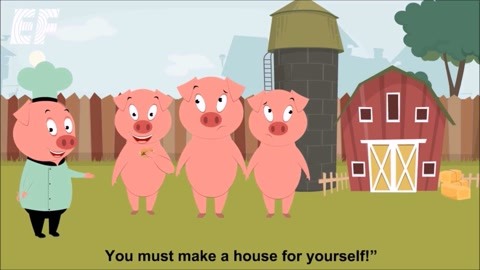 The eldest of the little pigs was called Browny, the second Whitey, and the youngest and best looking Blacky. Now Browny was a very dirty little pig, and, I am sorry to say, spent most of his time rolling and wallowing about in the mud. He was never so happy as on a wet day, when the mud in the farmyard got soft, and thick, and slab. Then he would steal away from his mother's side, and finding the muddiest place in the yard, would roll about in it and thoroughly enjoy himself.
The eldest of the little pigs was called Browny, the second Whitey, and the youngest and best looking Blacky. Now Browny was a very dirty little pig, and, I am sorry to say, spent most of his time rolling and wallowing about in the mud. He was never so happy as on a wet day, when the mud in the farmyard got soft, and thick, and slab. Then he would steal away from his mother's side, and finding the muddiest place in the yard, would roll about in it and thoroughly enjoy himself.
His mother often found fault with him for this, and would shake her head sadly and say, "Ah, Browny! Some day you will be sorry that you did not obey your old mother."
But no words of advice or warning could cure Browny of his bad habits.
Whitey was quite a clever little pig, but she was greedy. She was always thinking of her food, and looking forward to her dinner. And when the farm girl was seen carrying the pails across the yard, she would rise up on her hind legs and dance and caper with excitement.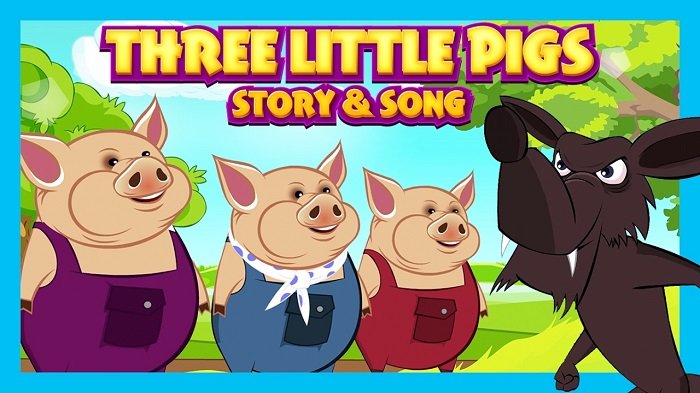 As soon as the food was poured into the trough she jostled Blacky and Browny out of the way in her eagerness to get the best and biggest bits for herself. Her mother often scolded her for her selfishness, and told her that someday she would suffer for being so greedy and grabbing.
As soon as the food was poured into the trough she jostled Blacky and Browny out of the way in her eagerness to get the best and biggest bits for herself. Her mother often scolded her for her selfishness, and told her that someday she would suffer for being so greedy and grabbing.
Blacky was a good, nice little pig, neither dirty nor greedy. He had nice dainty ways (for a pig), and his skin was always as smooth and shining as black satin. He was much cleverer than Browny and Whitey, and his mother's heart used to swell with pride when she heard the farmer's friends say to each other that someday the little black fellow would be a prize pig.
Now the time came when the mother pig felt old and feeble and near her end. One day she called the three little pigs round her and said, "My children, I feel that I am growing old and weak, and that I shall not live long. Before I die I should like to build a house for each of you, as this dear old sty in which we have lived so happily will be given to a new family of pigs, and you will have to turn out.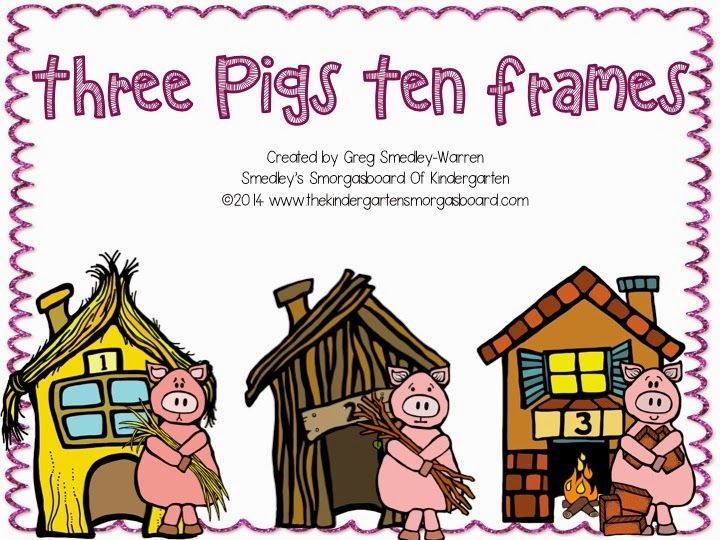 Now, Browny, what sort of a house would you like to have?"
Now, Browny, what sort of a house would you like to have?"
"A house of mud," replied Browny, looking longingly at a wet puddle in the corner of the yard.
"And you, Whitey?" said the mother pig in rather a sad voice, for she was disappointed that Browny had made so foolish a choice.
"A house of cabbage," answered Whitey, with a mouth full, and scarcely raising her snout out of the trough in which she was grubbing for some potato parings.
"Foolish, foolish child!" said the mother pig, looking quite distressed. "And you, Blacky?" turning to her youngest son. "What sort of a house shall I order for you?"
"A house of brick, please mother, as it will be warm in winter and cool in summer, and safe all the year round."
"That is a sensible little pig," replied his mother, looking fondly at him. "I will see that the three houses are got ready at once. And now one last piece of advice. You have heard me talk of our old enemy the fox. When he hears that I am dead, he is sure to try and get hold of you, to carry you off to his den.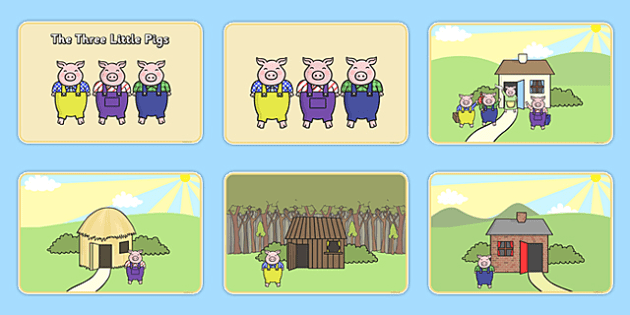 He is very sly and will no doubt disguise himself, and pretend to be a friend, but you must promise me not to let him enter your houses on any pretext whatever."
He is very sly and will no doubt disguise himself, and pretend to be a friend, but you must promise me not to let him enter your houses on any pretext whatever."
And the little pigs readily promised, for they had always had a great fear of the fox, of whom they had heard many terrible tales.
A short time afterwards the old pig died, and the little pigs went to live in their own houses.
Browny was quite delighted with his soft mud walls and with the clay floor, which soon looked like nothing but a big mud pie. But that was what Browny enjoyed, and he was as happy as possible, rolling about all day and making himself in such a mess.
One day, as he was lying half asleep in the mud, he heard a soft knock at his door, and a gentle voice said, "May I come in, Master Browny? I want to see your beautiful new house."
"Who are you?" said Browny, starting up in great fright, for though the voice sounded gentle, he felt sure it was a feigned voice, and he feared it was the fox.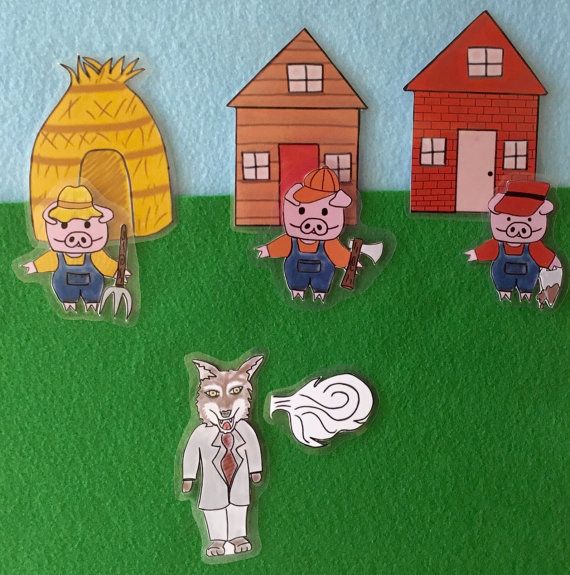
"I am a friend come to call on you," answered the voice.
"No, no," replied Browny, "I don't believe you are a friend. You are the wicked fox, against whom our mother warned us. I won't let you in."
"Oho! Is that the way you answer me?" said the fox, speaking very roughly in his natural voice. "We shall soon see who is master here," and with his paws he set to work and scraped a large hole in the soft mud walls. A moment later he had jumped through it, and catching Browny by the neck, flung him on his shoulders and trotted off with him to his den.
The next day, as Whitey was munching a few leaves of cabbage out of the corner of her house, the fox stole up to her door, determined to carry her off to join her brother in his den. He began speaking to her in the same feigned gentle voice in which he had spoken to Browny. But it frightend her very much when he said, "I am a friend come to visit you, and to have some of your good cabbage for my dinner."
"Please don't touch it," cried Whitey in great distress. "The cabbages are the walls of my house, and if you eat them you will make a hole, and the wind and rain will come in and give me a cold. Do go away. I am sure you are not a friend, but our wicked enemy the fox."
"The cabbages are the walls of my house, and if you eat them you will make a hole, and the wind and rain will come in and give me a cold. Do go away. I am sure you are not a friend, but our wicked enemy the fox."
And poor Whitey began to whine and to whimper, and to wish that she had not been such a greedy little pig, and had chosen a more solid material than cabbages for her house. But it was too late now, and in another minute the fox had eaten his way through the cabbage walls, and had caught the trembling, shivering Whitey and carried her off to his den.
The next day the fox started off for Blacky's house, because he had made up his mind that he would get the three little pigs together in his den, and then kill them, and invite all his friends to a feast. But when he reached the brick house, he found that the door was bolted and barred, so in his sly manner he began, "Do let me in, dear Blacky. I have brought you a present of some eggs that I picked up in a farmyard on my way here.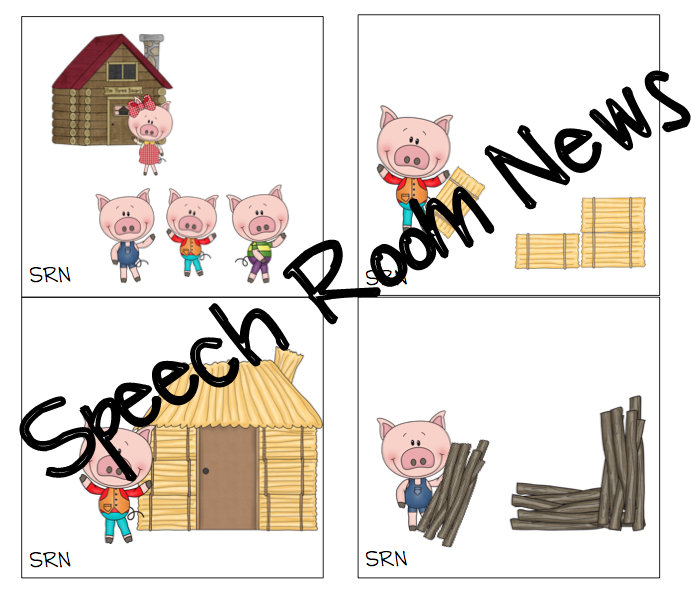 "
"
"No, no, Mister Fox," replied Blacky. "I am not gong to open my door to you. I know your cunning ways. You have carried off poor Browny and Whitey, but you are not going to get me."
At this the fox was so angry that he dashed with all his force against the wall, and tried to knock it down. But it was too strong and well built. And though the fox scraped and tore at the bricks with his paws, he only hurt himself, and at last he had to give it up, and limp away with his forepaws all bleeding and sore.
"Never mind!" he cried angrily as he went off. "I'll catch you another day, see if I don't, and won't I grind your bones to powder when I have got you in my den!" And he snarled fiercely and showed his teeth.
Next day Blacky had to go into the neighboring town to do some marketing and to buy a big kettle. As he was walking home with it slung over his shoulder, he heard a sound of steps stealthily creeping after him. For a moment his heart stood still with fear, and then a happy thought came to him.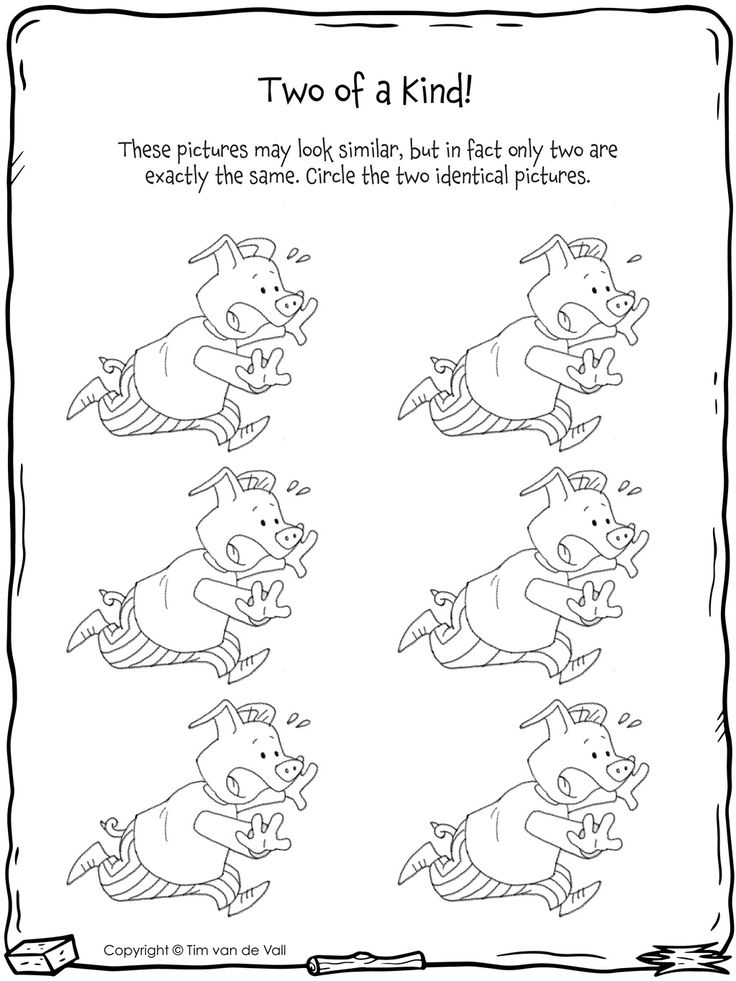 He had just reached the top of a hill, and could see his own little house nestling at the foot of it among the trees. In a moment he had snatched the lid off the kettle and had jumped in himself. Coiling himself round, he lay quite snug in the bottom of the kettle, while with his foreleg he managed to put the lid on, so that he was entirely hidden. With a little kick from the inside, he started the kettle off, and down the hill it rolled full tilt. And when the fox came up, all that he saw was a large black kettle spinning over the ground at a great pace. Very much disappointed, he was just going to turn away, when he saw the kettle stop close to the little brick house, and a moment later, Blacky jumped out of it and escaped with the kettle into the housed, when he barred and bolted the door, and put the shutter up over the window.
He had just reached the top of a hill, and could see his own little house nestling at the foot of it among the trees. In a moment he had snatched the lid off the kettle and had jumped in himself. Coiling himself round, he lay quite snug in the bottom of the kettle, while with his foreleg he managed to put the lid on, so that he was entirely hidden. With a little kick from the inside, he started the kettle off, and down the hill it rolled full tilt. And when the fox came up, all that he saw was a large black kettle spinning over the ground at a great pace. Very much disappointed, he was just going to turn away, when he saw the kettle stop close to the little brick house, and a moment later, Blacky jumped out of it and escaped with the kettle into the housed, when he barred and bolted the door, and put the shutter up over the window.
"Oho!" exclaimed the fox to himself. "You think you will escape me that way, do you? We shall soon see about that, my friend." And very quietly and stealthily he prowled round the house looking for some way to climb onto the roof.
In the meantime Blacky had filled the kettle with water, and having put it on the fire, sat down quietly waiting for it to boil. Just as the kettle was beginning to sing, and steam to come out of the spout, he heard a sound like a soft, muffled step, patter, patter, patter overhead, and the next moment the fox's head and forepaws were seen coming down the chimney. But Blacky very wisely had not put the lid on the kettle, and, with a yelp of pain, the fox fell into the boiling water, and before he could escape, Blacky had popped the lid on, and the fox was scalded to death.
As soon as he was sure that their wicked enemy was really dead, and could do them no further harm, Blacky started off to rescue Browny and Whitey. As he approached the den he heard piteous grunts and squeals from his poor little brother and sister who lived in constant terror of the fox killing and eating them. But when they saw Blacky appear at the entrance to the den, their joy knew no bounds. He quickly found a sharp stone and cut the cords by which they were tied to a stake in the ground, and then all three started off together for Blacky's house, where they lived happily ever after.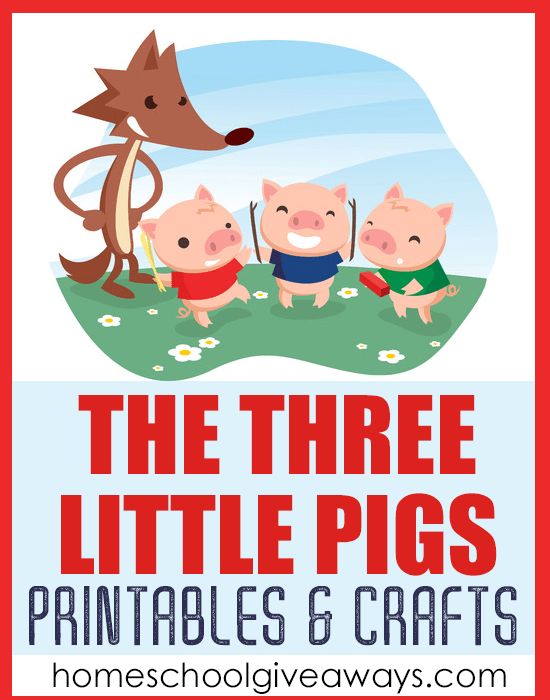 And Browny quite gave up rolling in the mud, and Whitey ceased to be greedy, for they never forgot how nearly these faults had brought them to an untimely end.
And Browny quite gave up rolling in the mud, and Whitey ceased to be greedy, for they never forgot how nearly these faults had brought them to an untimely end.
- Source: Andrew Lang, The Green Fairy Book, 7th impression (London: Longmans, Green, and Company, 1906), pp. 100-105. This book first appeared ca. 1892.
- Lang does not give his source, but this version appears to be a revision of the Halliwell story reproduced above, rewritten to meet the didactic expectations of Victorian England (and America).
- Return to the table of contents.
England
Another singular story is told on Dartmoor:There was once a fox, who, prowling by night in search of prey, came unexpectedly on a colony of pixies. Each pixy had a separate house. The first he came to was a wooden house.
"Let me in, let me in," said the fox.
"I won't," was the pixy's answer; "and the door is fastened."
Upon this the fox climbed to the top of the house; and having pawed it down, made a meal of the unfortunate pixy.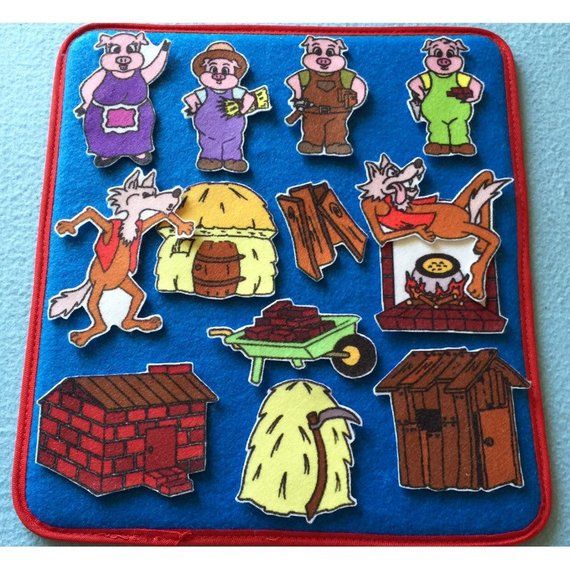
The next was a "stonen" house.
"Let me in," said the fox.
"The door is fastened," answered the pixy.
Again was the house pulled down, and its inmate eaten.
The third was an iron house. The fox again craved admittance, and was again refused.
"But I bring you good news," said the fox.
"No, no," replied the pixy; "I know what you want; you shall not come in here tonight."
That house the fox in vain attempted to destroy. It was too strong for him, and he went away in despair. But he returned the next night, and exerted all his fox-like qualities in the hope of deceiving the pixy. For some time he tried in vain ; until at last he mentioned a tempting field of turnips in the neighborhood, to which he offered to conduct his intended victim. They agreed to meet the next morning at four o'clock.
But the pixy outwitted the fox; for he found his way to the field, and returned laden with his turnips long before the fox was astir.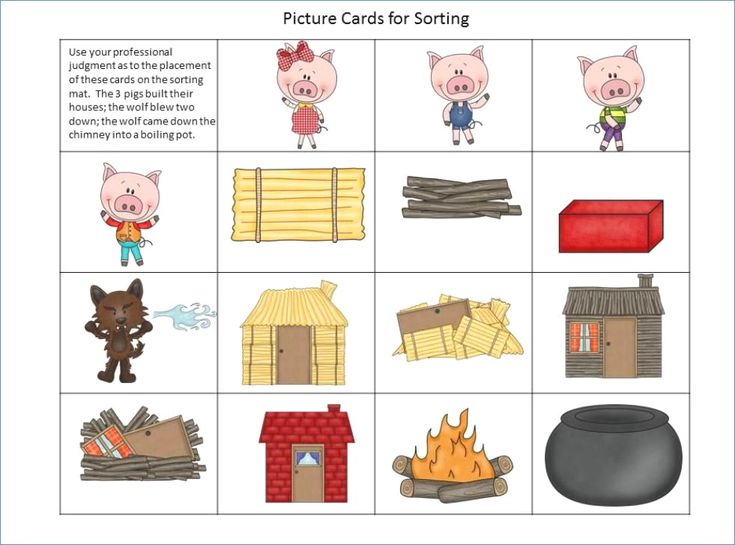 The fox was greatly vexed, and was long unable to devise another scheme, until he bethought himself of a great fair about to be held a short way off, and proposed to the pixy that they should set off for it at three in the morning.
The fox was greatly vexed, and was long unable to devise another scheme, until he bethought himself of a great fair about to be held a short way off, and proposed to the pixy that they should set off for it at three in the morning.
The pixy agreed. But the fox was again outwitted; for he was only up in time to meet the pixy returning home with his fairings: a clock, a crock, and a frying pan. The pixy, who saw the fox coming, got into the crock and rolled himself down the hill ; and the fox, unable to find him, abandoned the scent and went his way. The fox returned the next morning; and finding the door open went in, when he caught the pixy in bed, put him into a box, and locked him in.
"Let me out," said the pixy, " and I will tell you a wonderful secret."
The fox was after a time persuaded to lift the cover; and the pixy, coming out, threw such a charm upon him that he was compelled to enter the box in his turn; and there at last he died.
- Source: English Forests and Forest Trees: Historical, Legendary, and Descriptive (London: Ingram, Cooke, and Company, 1853), pp.
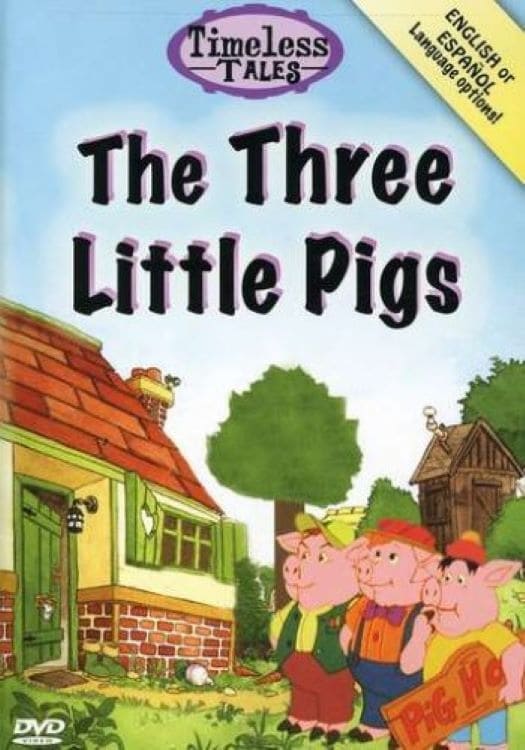 189-90.
189-90. - The anonymous author of this account does not give it a title.
- Katherine M. Briggs includes a version of this story in her A Dictionary of British Folk-Tales in the English Language, part A, vol. 2 (London: Routledge and Kegan Paul, 1970), pp. 528-30.
- Return to the table of contents.
England
There was once a Goose at the point of death,
So she called her three daughters near,
And desired them all, with her latest breath,
Her last dying words to hear."There's a Mr. Fox," said she, "that I know,
Who lives in a covert hard by,
To our race he has proved a deadly foe,
So beware of his treachery."Build houses, ere long, of stone or of bricks,
And get tiles for your roofs, I pray;
For I know, of old, Mr. Reynard's tricks,
And I fear he may come any day."Thus saying, she died, and her daughters fair, --
Gobble, Goosey, and Ganderee, --
Agreed together, that they would beware
Of Mr.Fox, their enemy.
But Gobble, the youngest, I grieve to say,
Soon came to a very bad end,
Because she preferred her own silly way,
And would not to her mother attend.For she made, with some boards, an open nest,
For a roof took the lid of a box;
Then quietly laid herself down to rest,
And thought she was safe from the Fox.But Reynard, in taking an evening run,
Soon scented the goose near the pond;
Thought he, " Now I'll have some supper and fun,
For of both I am really fond."Then on to the box he sprang in a trice,
And roused Mrs. Gobble from bed;
She only had time to hiss once or twice
Ere he snapped off her lily-white head.Her sisters at home felt anxious and low
When poor Gobble did not appear,
And Goosey, determined her fate to know,
Went and sought all the field far and near.At last she descried poor Gobble's head,
And some feathers not far apart,
So she told Ganderee she had found her dead,
And they both felt quite sad at heart.
Now Goosey was pretty, but liked her own way,
Like Gobble, and some other birds."
'Tis no matter," said she, "if I only obey
A part of my mother's last words."So her house she soon built of nice red brick,
But she only thatched it with straw;
And she thought that, however the fox might kick,
He could not get e'en a paw.So she went to sleep, and at dead of night
She heard at the door a low scratch;
And presently Reynard, with all his might,
Attempted to jump on the thatch.But he tumbled back, and against the wall
Grazed his nose in a fearful way,
Then, almost mad with the pain of his fall,
He barked, and ran slowly away.So Goosey laughed, and felt quite o'erjoyed
To have thus escaped from all harm;
But had she known how the Fox was employed,
She would have felt dreadful alarm;For Gobble had been his last dainty meat,
So hungry he really did feel, --
And resolved in his mind to accomplish this feat,
And have the young goose for a meal.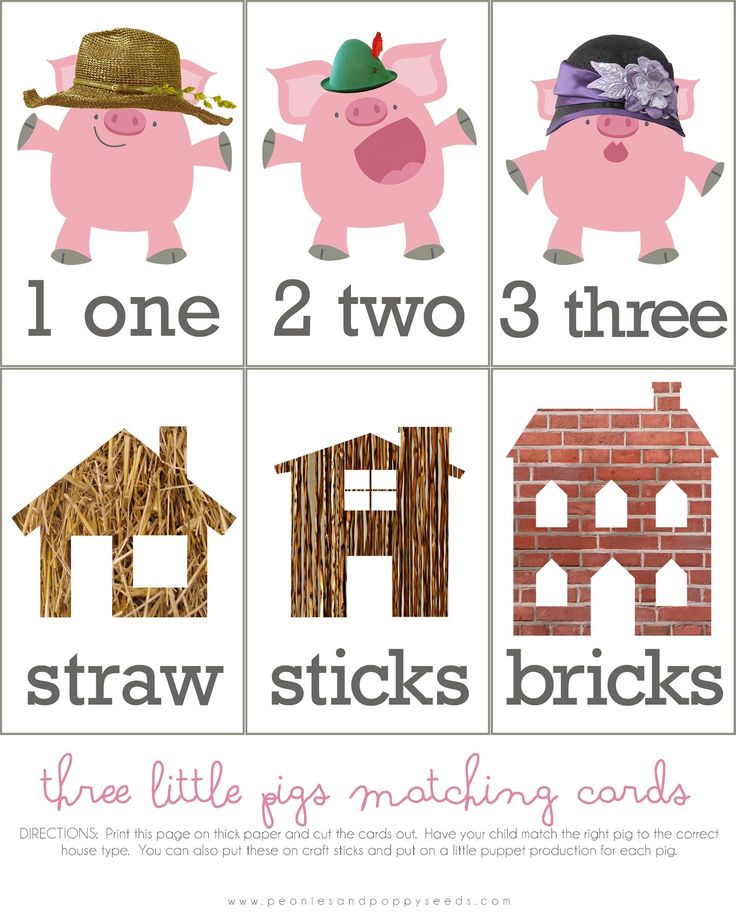
So he slyly lighted a bundle of straws,
And made no more noise than a mouse,
Then lifted himself up on his hind paws,
And quickly set fire to the house.'Twas soon in a blaze, and Goosey awoke,
With fright almost ready to die,
And, nearly smothered with heat and with smoke,
Up the chimney was forced to fly.The Fox was rejoiced to witness her flight,
And, heedless of all her sad groans,
He chased her until he saw her alight,
Then eat her up all but her bones.Poor Ganderee's heart was ready to break
When the sad news reached her ear.
"'Twas that villain the Fox," said good Mr. Drake,
Who lived in a pond very near."Now listen to me, I pray you," he said,
"And roof your new house with some tiles,
Or you, like your sisters, will soon be dead, --
A prey to your enemy's wiles."So she took the advice of her mother and friend,
And made her house very secure,
Then she said, -- "Now, whatever may be my end,
The Fox cannot catch me, I'm sure."
He called at her door the very next day,
And loudly and long did he knock,
But she said to him, -- "Leave my house, I pray,
For the door I will not unlock;"For you've killed my sisters I know full well,
And you wish that I too were dead."
"Oh dear," said the Fox, " I can't really tell
Who put such a thought in your head:"For I've always liked geese more than other birds,
And you of your race I've loved best."
But the Goose ne'er heeded his flattering words,
So hungry he went to his rest.Next week she beheld him again appear,
"Let me in very quick," he cried,
"For the news I've to tell you'll be charmed to hear,
And 'tis rude to keep me outside."But the Goose only opened one window-pane,
And popped out her pretty red bill,
Said she, "Your fair words are all in vain,
But talk to me here if you will.""Tomorrow," he cried, " there will be a fair,
All the birds and the beasts will go;
So allow me, I pray, to escort you there,
For you will be quite charmed I know."
"Many thanks for your news," said Ganderee,
"But I had rather not go with you;
I care not for any gay sight to see," --
So the window she closed, and withdrew.In the morning, howe'er, her mind she changed,
And she thought she would go to the fair;
So her numerous feathers she nicely arranged,
And cleaned her red bill with much care.She went, I believe, before it was light,
For of Reynard she felt much fear;
So quickly she thought she would see each sight,
And return ere he should appear.When the Goose arrived she began to laugh
At the wondrous creatures she saw;
There were dancing bears, and a tall giraffe,
And a beautiful red macaw.A monkey was weighing out apples and roots;
An ostrich, too, sold by retail;
There were bees and butterflies tasting the fruits,
And a pig drinking out of a pail.Ganderee went into an elephant's shop,
And quickly she bought a new churn;
For, as it grew late, she feared to stop,
As in safety she wished to return.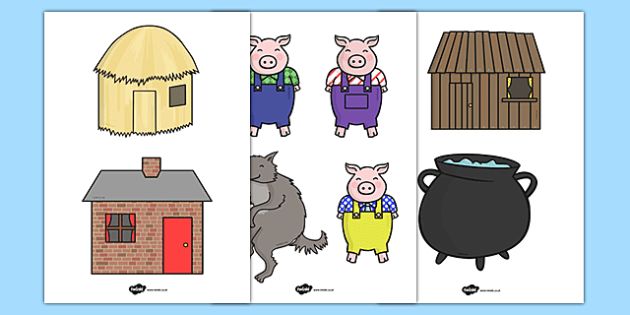
Ere, however, she got about half the way,
She saw approaching her foe;
And now she hissed with fear and dismay,
For she knew not which way to go.But at last of a capital plan she bethought,
Of a place where she safely might hide;
She got into the churn that she had just bought,
And then fastened the lid inside.The churn was placed on the brow of a hill,
And with Ganderee's weight down it rolled,
Passing the Fox, who stood perfectly still,
Quite alarmed, though he was very bold.For the Goose's wings flapped strangely about,
And the noise was fearful to hear;
And so bruised she felt she was glad to get out,
When she thought that the coast was clear.So safely she reached her own home at noon,
And the Fox ne'er saw her that day;
But after the fair he came very soon,
And cried out in a terrible way, --"Quick, quick, let me in! oh, for once be kind,
For the huntsman's horn I hear;
Oh, hide me in any snug place you can find,
For the hunters and hounds draw near."
So the Goose looked out in order to see
Whether Reynard was only in jest;
Then, knowing that he in her power would be,
She opened the door to her guest."I'll hide you," she said, " in my nice new churn."
"That will do very well," said he;
"And thank you for doing me this good turn,
Most friendly and kind Ganderee."Then into the churn the Fox quickly got;
But, ere the Goose put on the top,
A kettle she brought of water quite hot,
And poured in every drop.Then the Fox cried out, "O! I burn, I burn,
And I feel in a pitiful plight;"
But the Goose held fast the lid of the churn,
So Reynard he died that night.Moral
Mankind have an enemy whom they well know,
Who tempts them in every way;
But they, too, at length shall o'ercome this foe,
If wisdom's right law they obey.
- Source: A Treasury of Pleasure Books for Young People, [edited by J.
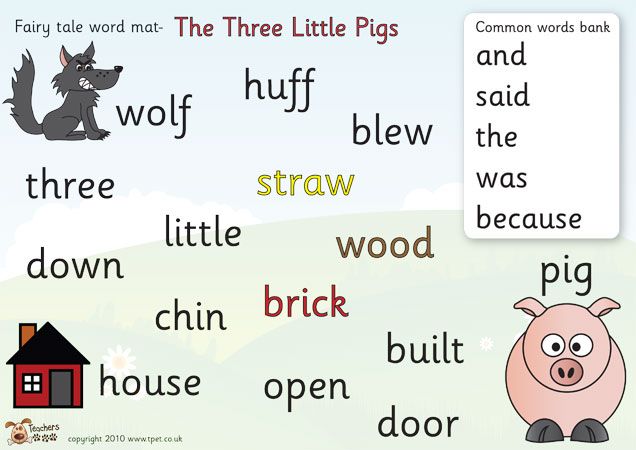 Cundall] (London: Sampson, Low, and Son, 1856), no. 11. Each story in this collection is paginated separately.
Cundall] (London: Sampson, Low, and Son, 1856), no. 11. Each story in this collection is paginated separately. - Return to the table of contents.
African-American
Brer Rabbit could never get any peace. He couldn't leave home without Brer Wolf making a raid and toting off some of the family. Brer Rabbit built himself a straw house, and it was torn down. Then a made a house out of pine tops, and that went the same way. Then he made himself a bark house, and it was raided. And every time he lost a house, he lost one of his children.
At last Brer Rabbit got mad, he did, and cussed, and then he went off, he did, and got some carpenters, and they built him a plank house with a rock foundation. After that he could have some peace and quiet. He could go out and pass the time of day with his neighbors, and come back and sit by the fire and smoke his pipe and read the newspapers the same as any man who has a family.
He made a hole, he did, in the cellar where the little rabbits could hide out when there was much of a racket in the neighborhood, and the latch of the front door caught on the inside.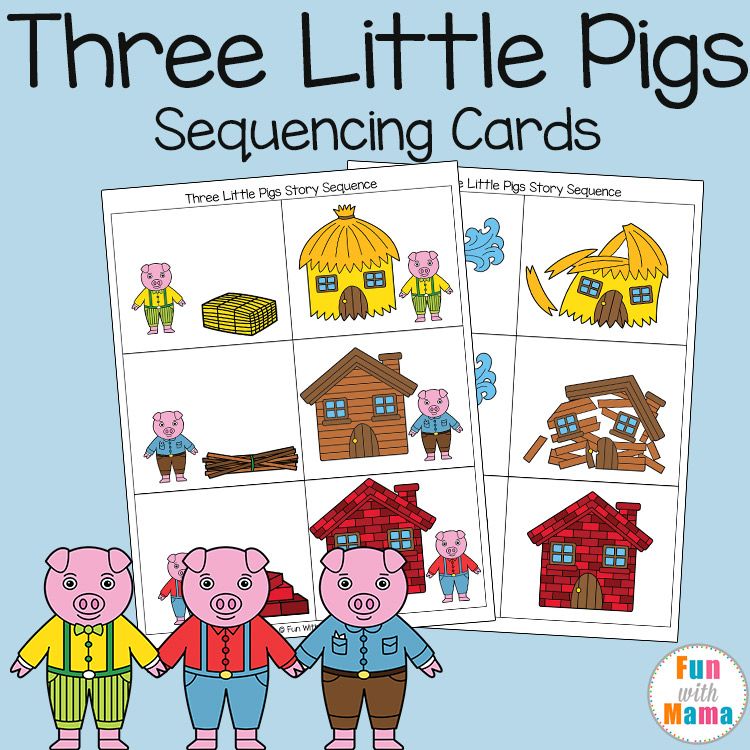
Brer Wolf, he saw the lay of the land, he did, and he laid low. The little rabbits were mighty skittish, but it got so that cold chills didn't run up Brer Rabbit's back any more when he heard Brer Wolf go galloping by.
By and by, one day when Brer Rabbit was fixing to call on Miss Coon, he heard a monstrous fuss and clatter up the big road, and almost before he could fix his ears to listen, Brer Wolf ran in the door. The little rabbits, they went into the hole in the cellar, they did, like blowing out a candle. Brer Wolf was fairly covered with mud, and mighty well nigh out of wind.
"Oh, do pray save me, Brer Rabbit!" said Brer Wolf. "Do please, Brer Rabbit! The dogs are after me, and they'll tear me up. Don't you hear them coming? O, do please save me, Brer Rabbit! Hide me somewhere the dogs won't get me."
No quicker said than done.
"Jump in that chest there, Brer Wolf," said Brer Rabbit. "Jump in there and make yourself at home."
In jumped Brer Wolf, down came the lid, and into the hasp went the hook, and there Mr.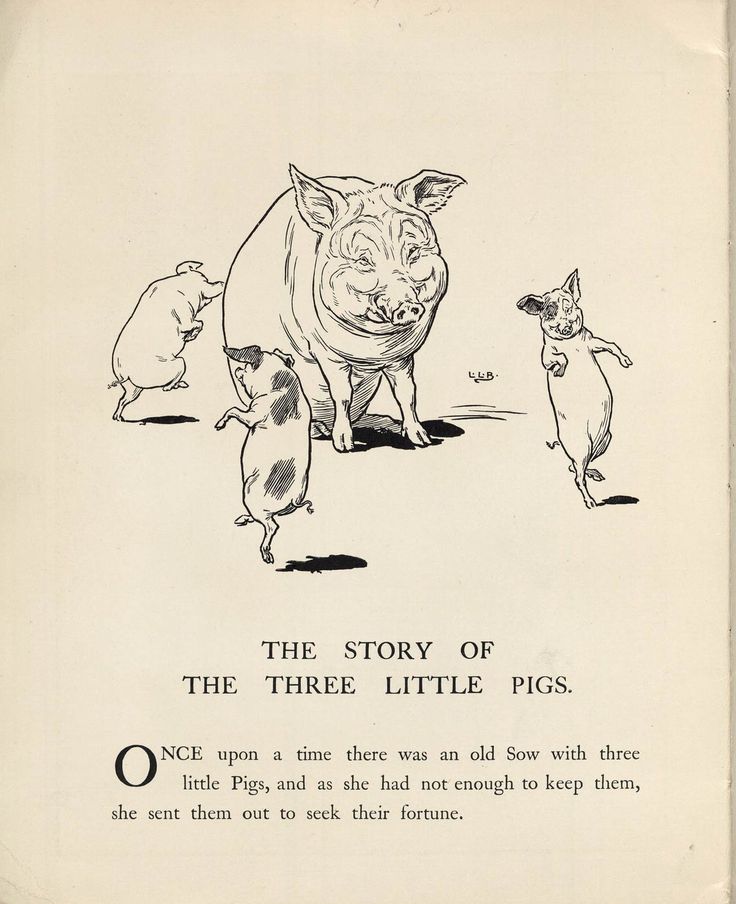 Wolf was. Then Brer Rabbit went to the looking-glass, he did, and winked at himself. And then he pulled the rocking chair in front of the fire, he did, and took a big chew of tobacco. Then Brer Rabbit sat there a long time, he did, turning his mind over and working his thinking machine. By and by he got up and sort of stirred around.
Wolf was. Then Brer Rabbit went to the looking-glass, he did, and winked at himself. And then he pulled the rocking chair in front of the fire, he did, and took a big chew of tobacco. Then Brer Rabbit sat there a long time, he did, turning his mind over and working his thinking machine. By and by he got up and sort of stirred around.
Then Brer Wolf opened up, "Are the dogs all gone, Brer Rabbit?"
"It seems like I hear one of them smelling around the chimney corner just now."
Then Brer Rabbit got the kettle and filled it full of water and put it on the fire.
"What are you doing now, Brer Rabbit?"
"I'm fixing to make you a nice cup of tea, Brer Wolf."
Then Brer Rabbit went to the cupboard and got the gimlet, and commenced to bore little holes in the chest lid.
"What are you doing now, Brer Rabbit?"
"I'm boring little holes so you can breathe, Brer Wolf."
Then Brer Rabbit went out and got some more wood, and flung it on the fire.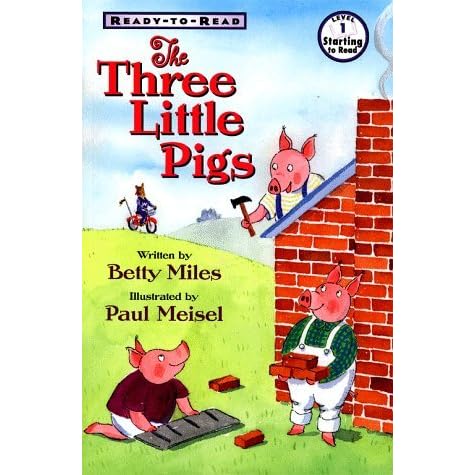
"What are you doing now, Brer Rabbit?"
"I'm chunking up the fire so you won't get cold, Brer Wolf."
Then Brer Rabbit went down into the cellar and fetched out all his children.
"What are you doing now, Brer Rabbit?"
"I'm telling my children what a nice man you are, Brer Wolf."
And the children, they had to put their hands on their mouth to keep from laughing. Then Brer Rabbit, he got the kettle and commenced to pour the hot water onto the chest lid.
"What's that I hear, Brer Rabbit?"
"You hear the wind a-blowing, Brer Wolf."
Then the water began to sift through.
"What's that I feel, Brer Rabbit?"
"You feel the fleas a-biting, Brer Wolf."
"They are biting might hard, Brer Rabbit."
"Turn over on the other side, Brer Wolf."
"What's that I feel now, Brer Rabbit?"
"You still feel the fleas, Brer Wolf."
"They are eating me up, Brer Rabbit."
And those were the last words of Brer Wolf, because the scalding water did the business.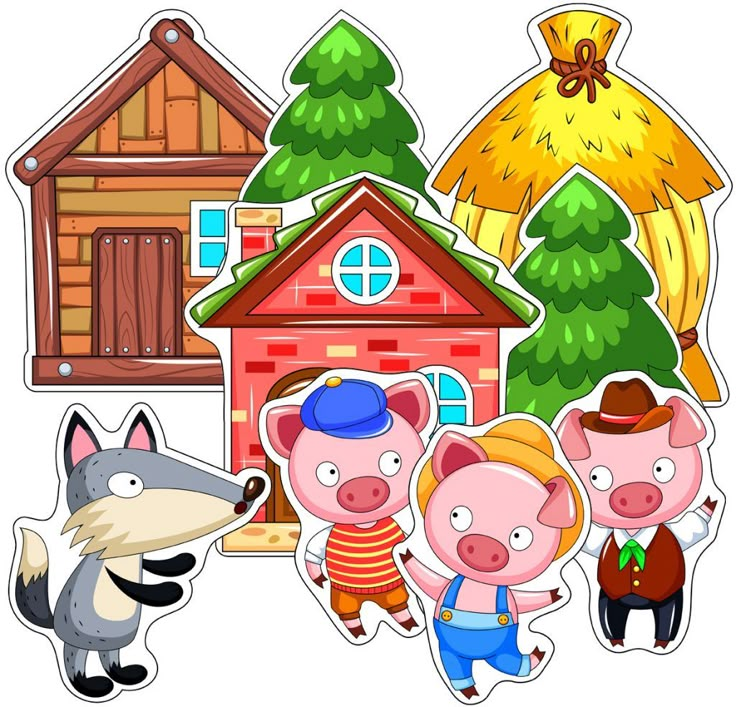
Then Brer Rabbit called in his neighbors, he did, and they held a regular jubilee. And if you go to Brer Rabbit's house right now, I don't know but what you'll find Brer Wolf's hide hanging in the back porch, and all because he was so busy with other folks's doings.
- Source: Joel Chandler Harris, Uncle Remus: His Songs and His Sayings (New York: McKinlay, Stone, and Mackenzie, 1908) no. 13, pp. 62-68.
- Dialect normalized by D. L. Ashliman. © 2000.
- Return to the table of contents.
African-American
One time, away back yonder, the old sow and her children were all living longer than the other creatures. It seems to me that the old sow was a widow-woman, and if I am not mistaken, that that she had five children. Let me see, there was Big Pig, and there was Little Pig, and there was Speckled Pig, and there was Blunt, and last and lonesome, there was Runt.
One day this here pig mother, she knew that she was going to kick the bucket, and she took and called up all her children and told them that the time had come when they had to look out for themselves. And then she up and told them as good as she could, although her breath was mighty scant, about what a bad man old Brer Wolf was. She said that if they could escape from old Brer Wolf, they'd be doing monstrously well.
And then she up and told them as good as she could, although her breath was mighty scant, about what a bad man old Brer Wolf was. She said that if they could escape from old Brer Wolf, they'd be doing monstrously well.
Big Pig allowed that she wasn't afraid. Speckled Pig allowed that she wasn't afraid. Blunt, he said that he was almost as big a man as Brer Wolf himself. And Runt, she just took and rooted around in the straw and grunted. But old Widow Sow, she lay there, she did, and kept on telling them that they had better keep their eyes on Brer Wolf, because he was a very mean and deceitful man.
Not long after that, sure enough, old Miss Sow lay down and died, and all of those children of hers were flung back on themselves, and they whirled in, they did, and each one built himself a house to live in. Big Pig, she took and built herself a house out of brush. Little Pig, she took and built a stick house. Speckled Pig, she took and built a mud house. Blunt, he took and built a plank house. And Runt, she didn't make any great to-do, and no great brags, but she went to work, she did, and built a rock house.
And Runt, she didn't make any great to-do, and no great brags, but she went to work, she did, and built a rock house.
By and by, when they had everything fixed up, and matters were sort of settled, early one morning here came old Brer Wolf licking his chops and shaking his tail. The first house he came to was Big Pig's house. Brer Wolf walked up to the door, he did, and he knocked sort of softly, blim! blim! blim! Nobody answered. Then he knocked loudly, blam! blam! blam! This woke up Big Pig, and she came to the door, and she asked who it was.
Brer Wolf allowed it was a friend, and he sang out:
If you'll open the door and let me in,
I'll warm my hands and go home again.
Big Pig asked again who it was, and then Brer Wolf up and said, "How's your ma?"
"My ma is dead," she said, "and before she died, she told me to keep my eyes on Brer Wolf. I see you through the crack in the door, and you look mighty like Brer Wolf.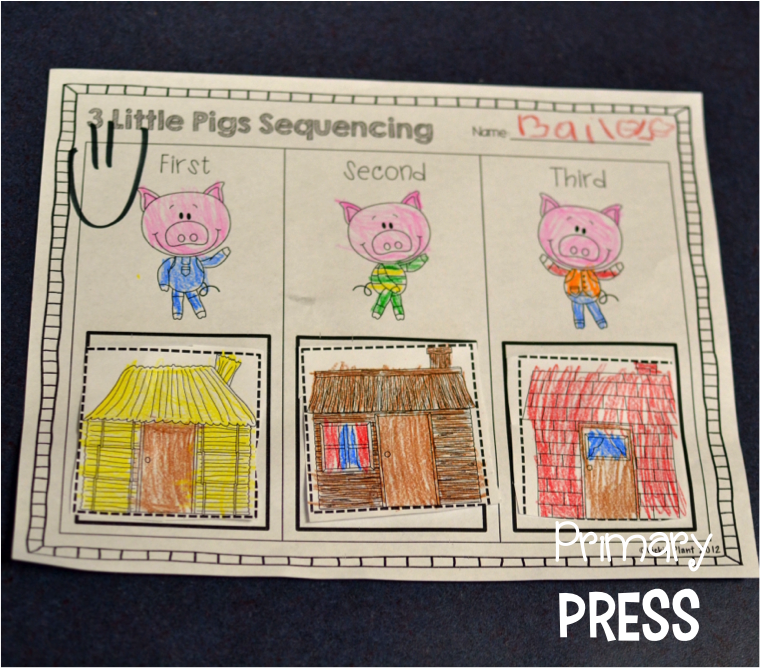 "
"
Then old Brer Wolf, he drew a long breath, like he felt very bad, and then he up and said, "I don't know what changed her mind, unless she was out of her head. I heard tell that old Miss Sow was sick, and I said to myself that I'd ought to drop around and see how the old lady is, and fetch her this here bag of roasting ears. I know might well that if your ma was here right now, in her right mind, she'd take the roasting ears and be glad to get them, and more than that, she'd ask me in by the fire to warm my hands," said old Brer Wolf.
The talk about the roasting ears made Big Pig's mouth water, and by and by, after some more palaver, she opened the door and let Brer Wolf in, and bless your soul, that was the last of Big Pig. She didn't have time to squeal, or to grunt either, before Brer Wolf gobbled her up.
The next day old Brer Wolf put up the same game on Little Pig. He went and sang his song, and Little Pig, she took and let him in, and then Brer Wolf, he took and returned the compliments and let Little Pig in.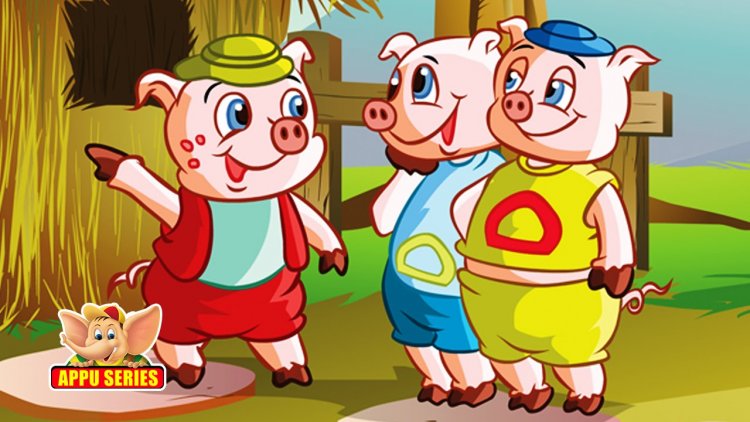 Little Pig, she let Brer Wolf in, and Brer Wolf, he let Little Pig in, and what more can you ask than that?
Little Pig, she let Brer Wolf in, and Brer Wolf, he let Little Pig in, and what more can you ask than that?
The next time Brer Wolf paid a call, he dropped in on Speckled Pig, and rapped at the door, and sang his song:
If you'll open the door and let me in,
I'll warm my hands and go home again.
But Speckled Pig, she kind of suspected something, and she refused to open the door. Yet Brer Wolf was a mighty deceitful man, and he talked mighty soft, and he talked mighty sweet. By and by, he got his nose in the crack of the door, and he said to Speckled Pig, to just let him get one paw in, and then he won't go any further. He got the paw in, and then he begged to get the other paw in, and then when he got that in, he begged to get his head in, and then when he got his head in, and his paws in, of course all he had to do was to shove the door open and walk right in. And when matters stood that way, it wasn't long before he made fresh meat of Speckled Pig.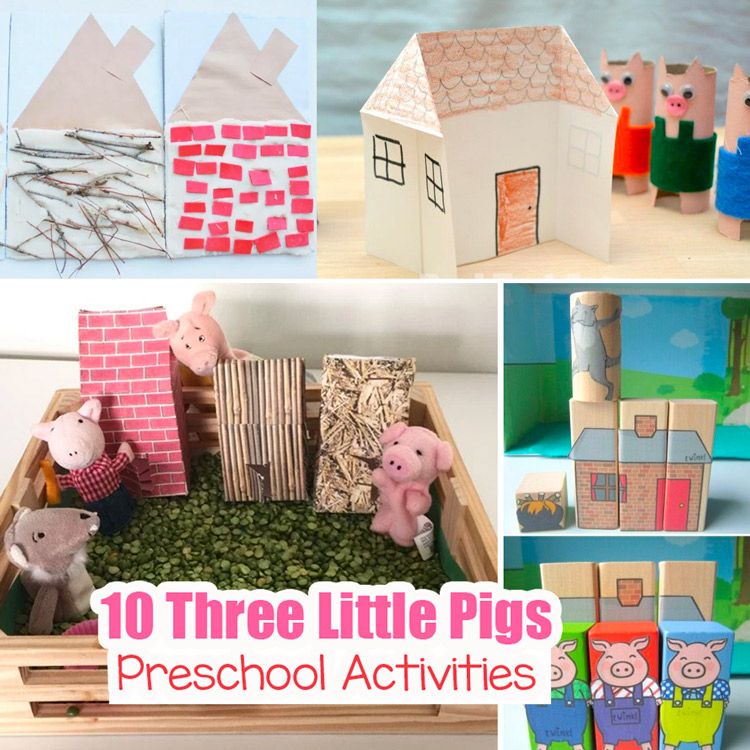
The next day, he did away with Blunt, and the day after that he allowed that he would make a pass at Runt. Now then, right there is where old Brer Wolf slipped up. He is like some folks I know. He'd have been mighty smart, if he hadn't been too smart. Runt was the littlest one of the whole gang, yet all the same, the news was out that she was pestered with sense like grown folks.
Brer Wolf, he crept up to Runt's house, and he got underneath the window, he did, and he sang out:
If you'll open the door and let me in,But all the same, Brer Wolf couldn't coax Runt to open the door, neither could he break in, because the house was made of rock. By and by Brer Wolf made out like he'd gone off, and after a while he came back and knocked at the door, blam, blam, blam!
I'll warm my hands and go home again.
Runt, she sat by the fire, she did, and sort of scratched her ear, and hollered out, "Who's that?"
"It's Speckled Pig," said old Brer Wolf, between a snort and a grunt.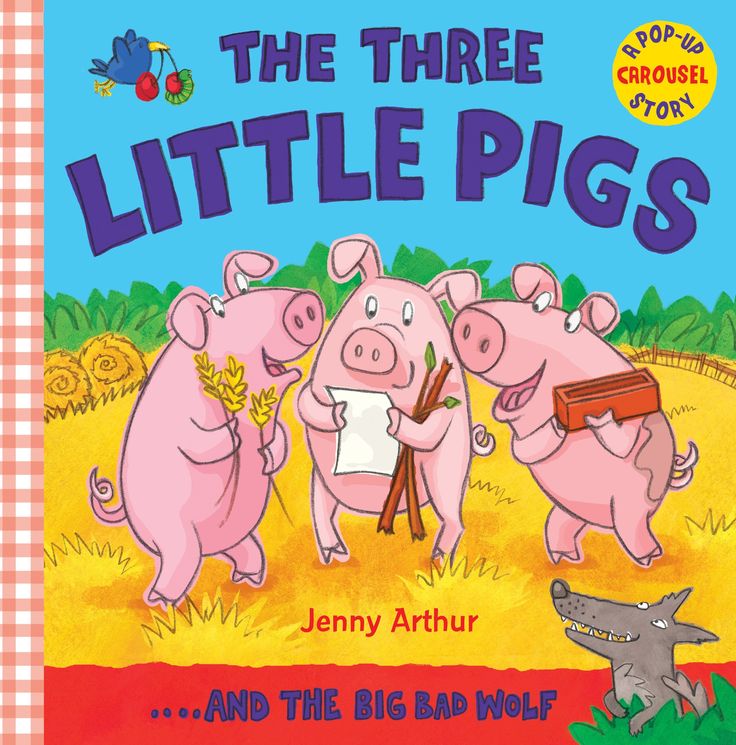 "I fetched you some peas for your dinner!"
"I fetched you some peas for your dinner!"
Runt, she took and laughed, she did, and hollered back, "Sis Speckled Pit never talked through that many teeth."
Brer Wolf went off again, and by and by he came back and knocked.
Runt, she sat on a rock and hollered out, "Who's that?"
"Big Pig," said Brer Wolf. I fetched some sweet corn for your supper."
Runt, she looked through the crack underneath the door, and laughed, and said, "Sis Big Pig didn't ever have any hair on her hooves.
Then old Brer Wolf, he got mad, he did, and he said he was going to come down the chimney. And Runt, she said that that was the only way that he could get in. And then when she heard Brer Wolf climbing up on the outside of the chimney, she took and piled up a whole lot of broom straw in front of the hearth, and when she heard him climbing down on the inside, she took the tongs and shoved the straw onto the fire, and the smoke made Brer Wolf's head swim, and he dropped down, and before he knew it, he was burned to a crackling.
And that was the last of old Brer Wolf. At least it was the last of that Brer Wolf.
- Source: Joel Chandler Harris, Nights with Uncle Remus: Myths and Legends of the Old Plantation (Boston and New York: Houghton, Mifflin, and Company, 1883), no. 8, pp. 38-43.
- Dialect normalized by D. L. Ashliman. © 2000.
- Return to the table of contents.
North Carolina, USA
Did you done hear how come that old Sis Pig can see the wind? Well, to be sure, ain't you never hear that? Well, don't you take noticement, many and many a time, how unrestful, and 'stracted like, the pigs is, when the wind blows, and how they squeal, and run this yer way and that yer way, like they's 'stracted?Well, sah, all dat gwine on is along of the fact that they can see the wind. One time the old sow, she have five little pigs, -- four black and one white one.
Now old Brer Wolf, he have a mighty good mouth for pig meat, and he go every night and walk round and round Miss Pig's house, but Sis Pig, she have the door lock fast.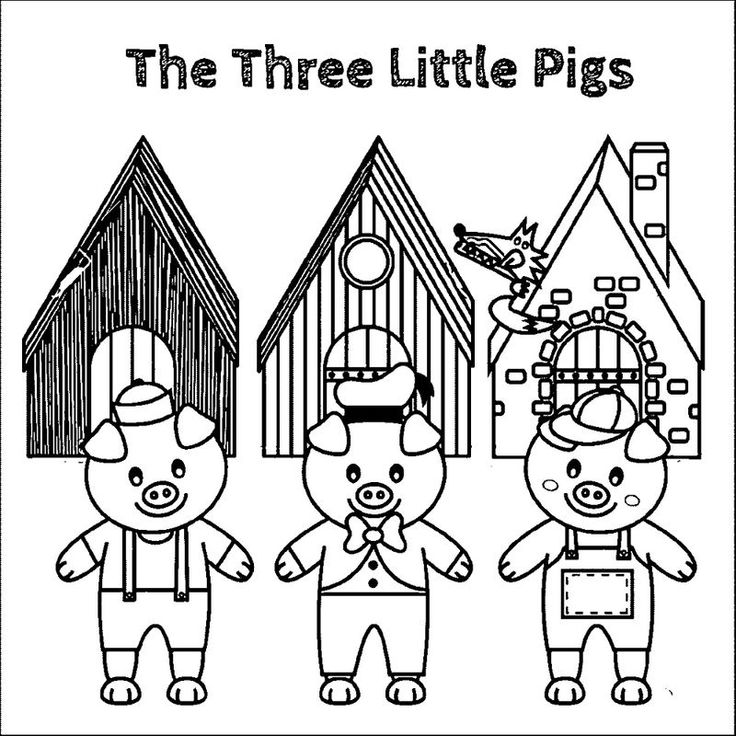
One night, he dress up just like he was a man, and he put a tall hat on he head, and shoes on he foots; he take a sack of corn, and he walk hard, and make a mighty fuss on the brick walk, right up to the door, and he knock loud on the door in a great haste, and Sis Pig, she say, "Who there?"
And Brer Wolf say up, loud and powerful, Brer Wolf did, "Quit your fooling, old woman, I is the master, come for to put my mark on the new pigs; turn 'em loose here lively."
And old Sis Pig, she mighty skeered, but she feared not to turn 'em out; so she crack the door, and turn out the four black pigs, but the little white pig, he am her eyeballs, the little white pig was, and when he turn come, she just shut the door and hold it fast.
And Brer Wolf, he turn down the corn, and just pick up the four little pigs and tote 'em off home; but when they done gone, he mouth hone for the little pig, but Sis Pig, she keep him mighty close. One night Brer Wolf was wandering up and down the woods, and he meet up with old Satan, and he ax Brer Wolf, old Satan did, can he help him, and Brer Wolf he just tell him what on he mind, and old Satan told him to lead on to Miss Pig's house, and he help him out.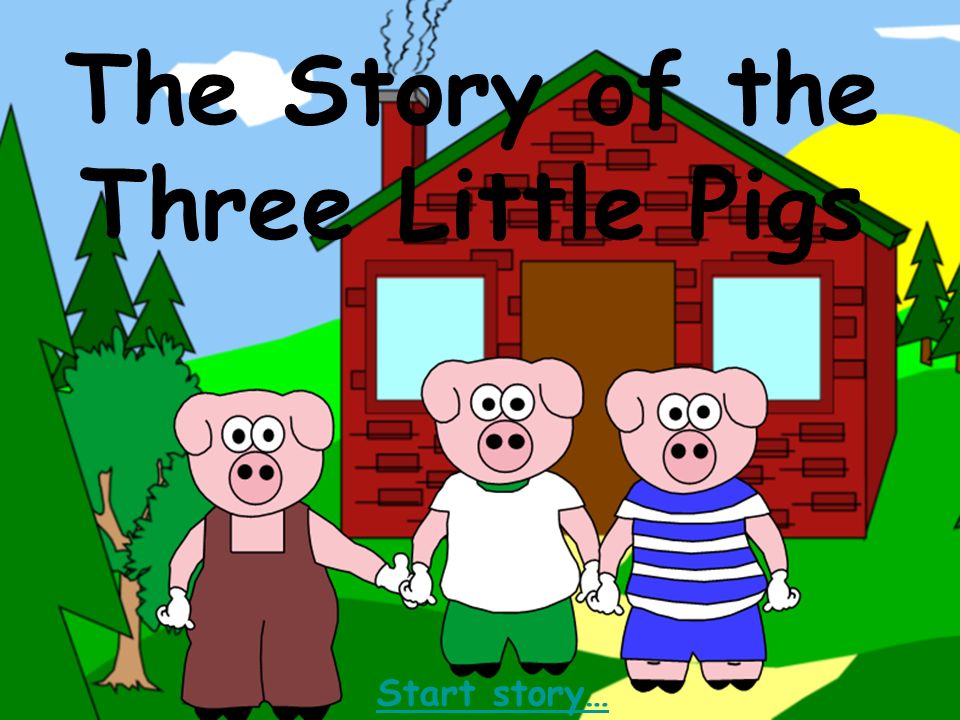
So Brer Wolf he lead on, and directly there Sis Pig's house, and old Satan, he 'gin to puff and blow, and puff and blow, till Brer Wolf he that skeered, Brer Wolf is, that he hair fairly stand on end; and Miss Pig she done hear the mighty wind, and the house a-cracking, and they hear her inside down on her knees, just calling on God A'mighty for mercy; but old Satan, he puff and blow, and puff and blow, and the house crack and tremble, and he say, old Satan did, "You hear this yer mighty wind, Sis Pig, but if you look this yer way you can see it."
And Sis Pig, she that skeered, she crack the door and look out, and there she see old Satan's breath, like red smoke, blowing on the house, and from that day the pigs can see the wind, and it look red, the wind look red, sah. How we know that? I tell you how we know that, sah: if anybody miss a pig and take the milk, then they can see the wind, and they done tell it was red.
- Source: Emma M. Backus, "Animal Tales from North Carolina," The Journal of American Folklore, vol.
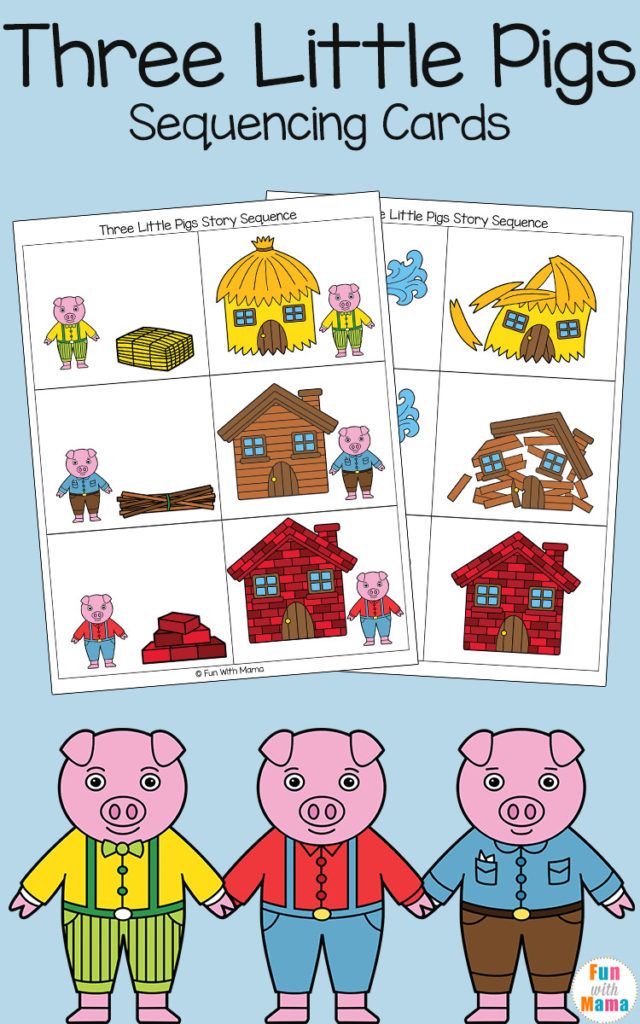 11, no. 43 (October - December, 1898), pp. 284-92. This tale is no. 7 (pp. 290-92) in Backus' collection.
11, no. 43 (October - December, 1898), pp. 284-92. This tale is no. 7 (pp. 290-92) in Backus' collection. - Return to the table of contents.
Virginia, USA
Version A
Once there lived a little pig in a very close little room. A wolf would come by every day and try to fool the little pig out, so he could eat him. One morning the wolf called, but the pig did not answer him.The wolf was very sure the little pig was in there: so he said, "I know where a plenty of grapes. You better come and go with me."
When the wolf was gone, the little pig put out for the grapevine. By that time the wolf came to the pig's home and called him again. He did not receive any answer. Then he put out to the grape tree too. When the pig saw the wolf, he hid in some moss on the tree. The wolf saw the pig before he got there; and when he got there, he called the pig, but he did not get any answer. By that time the wolf started to climb the tree.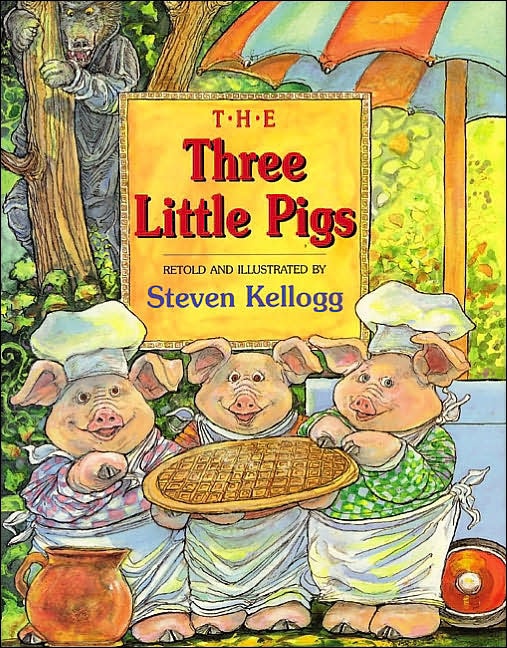 When he got to the little pig, the little pig ran out and jumped and ran away, and got home before the wolf caught him. By the time the little pig jumped in his door and shut it, the wolf had his head in the door, and it caught his head.
When he got to the little pig, the little pig ran out and jumped and ran away, and got home before the wolf caught him. By the time the little pig jumped in his door and shut it, the wolf had his head in the door, and it caught his head.
He said to the pig, "Let me go! I will not hurt you."
The pig opened the do' a little, and the wolf jumped in. The pig caught him by the leg, but he was afeard: so he said, "Yonder come de dogs."
"Let me in! Let me in! Hide me in the box! The dogs will catch me!" said the wolf. The pig did so, but he got angry and began to put holes in the box.
"What are you doing? " said the wolf. "Putting holes so you can get air," said the pig.
"Oh, indeed!" said the wolf.
When the pig got the holes in the box, he put on some water. When it was very hot, he said, "Don't you want some cool water poured on yo' to mek yo' feel good?"
"Yes," said the wolf. So the pig po'ed hot water on him and killed him.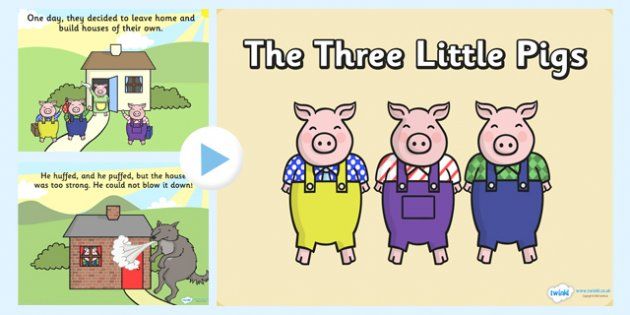
Version B
A long time ago Brer Wolf and Brer Rabbit were good friends, but for some reason or other they became deadly enemies. Brer Wolf decided to do Brer Rabbit harm. Brer Rabbit staid in his house most of the time, so Brer Wolf couldn't get at him. Wolf, however, thought of a way to get him out by stratagem. He knew that Brer Rabbit liked fruit: so he went to Brer Rabbit's door one night, and told him he knew where some fine large apples grew, and asked him if he would like to go and get some.Brer Rabbit very politely accepted the invitation, and agreed to go for the apples next morning at five o'clock. Brer Wolf trotted off home to dream of the sweet revenge he was going to have on Brer Rabbit, but Brer Rabbit was on to his tricks.
Promptly at three o'clock he went after his apples, and was back quite a while before five o'clock. As the clocks struck five, Brer Wolf tapped on the door. "Are you ready to go for dem apples, Brer Rabbit?" says 'e.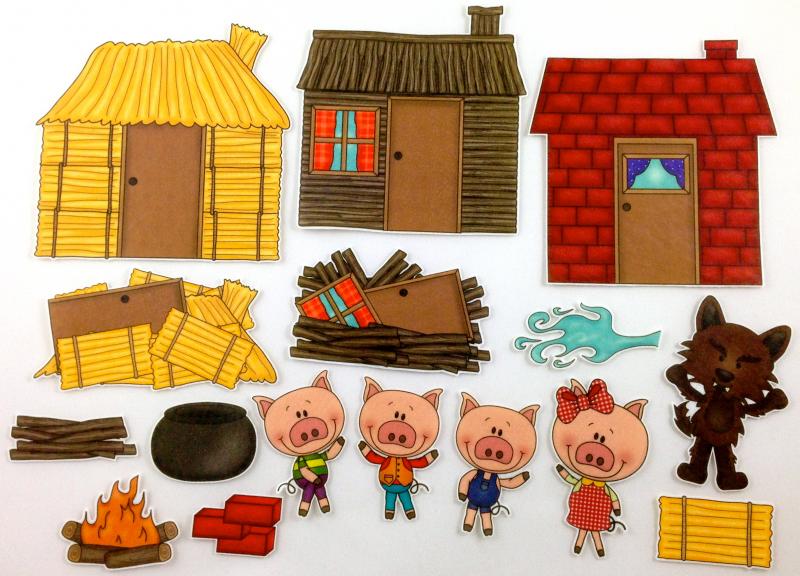
Brer Rabbit says, "La', Brer Wolf, my watch said five o'clock long 'go, and I thought you wasn't comin', so Ise done been."
Brer Wolf was so mad he couldn't stand still; but he did not give up his hope for revenge, so he told Brer Rabbit 'bout some peaches which were farther away from Brer Rabbit's house than the apples. Brer Rabbit gladly consented to go, this time at four o'clock; but when Brer Wolf came after him next morning, he had been fooled again, and Brer Rabbit was inside enjoying his peaches.
This time Brer Wolf was so mad dat his har turned gray, but he wouldn't give up. He decided to send Brer Rabbit on a fool's errand: so he told him about some fine pears. They grew on a distant hill very far away. There wa'n't no pears dere at all. Brer Wolf jest want to get Brer Rabbit out of his house one more time. They agreed to go at three o'clock this time.
Brer Rabbit started out ahead of time, as usual; but Brer Wolf, who had caught on to him, started out early too. He first caught sight of Brer Rabbit sittin' on de hill resting, den he kinder laughed up his sleeve when he thought how tired he must be from walking so far, an' how mad he must be for bein' fooled. After waiting a while, so's to catch his wind, he started out as if to speak to Brer Rabbit.
He first caught sight of Brer Rabbit sittin' on de hill resting, den he kinder laughed up his sleeve when he thought how tired he must be from walking so far, an' how mad he must be for bein' fooled. After waiting a while, so's to catch his wind, he started out as if to speak to Brer Rabbit.
Brer Rabbit knew there was trouble in the wind: so, as soon as he saw Brer Wolf comin', he made a break for home. Right down de hill he went, and Brer Wolf started right behind him. It was a race for life; and Brer Rabbit did his level best, while old Brer Wolf was equal to the occasion. They ran through cornfields, through woods and across fields, 'til they got in sight of Brer Rabbit's house. The sight of the house gave Brer Rabbit new courage and strength; so that he made a final break, and got in the house and locked the door just as Brer Wolf rushed 'ginst it.
Brer Wolf tried all of his force to open the door; and as he failed, he decided to come down the chimney.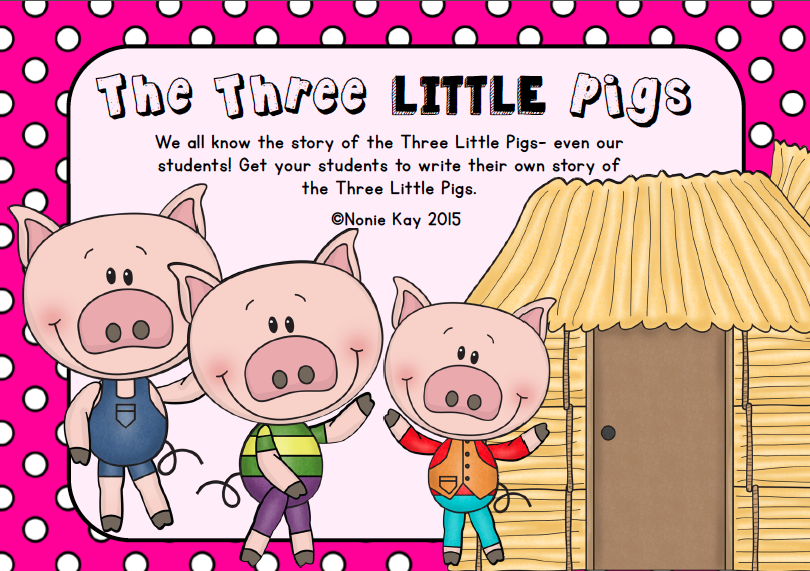 Brer Rabbit had no intention of letting any one come down the chimney after him: so he just set a big kettle of boiling water right under the chimney; and when Brer Wolf dropped down, he went smack into the kettle. Den Brer Rabbit slapped on de cover, and he had Brer Wolf just where he wanted him.
Brer Rabbit had no intention of letting any one come down the chimney after him: so he just set a big kettle of boiling water right under the chimney; and when Brer Wolf dropped down, he went smack into the kettle. Den Brer Rabbit slapped on de cover, and he had Brer Wolf just where he wanted him.
Brer Wolf make all kinds of whining entreaties for Brer Rabbit to let him out, but it wasn't no better for him. Brer Rabbit made a fine stew of Brer Wolf, and eat applesauce and peaches along with him. After this he went after fruit whenever he got ready, without fear of being caught by Brer Wolf.
- Source: A. M. Bacon and E. C. Parsons, "Folk-Lore from Elizabeth City County, Virginia," The Journal of American Folklore, vol. 35, no. 137 (July - September, 1922), pp. 250-327. This tale is no. 17 (pp. 267-69) in Bacon's and Parsons' collection.
- Return to the table of contents.
Italy
Once upon a time there were three goslings who were greatly afraid of the wolf, for if he found them he would eat them.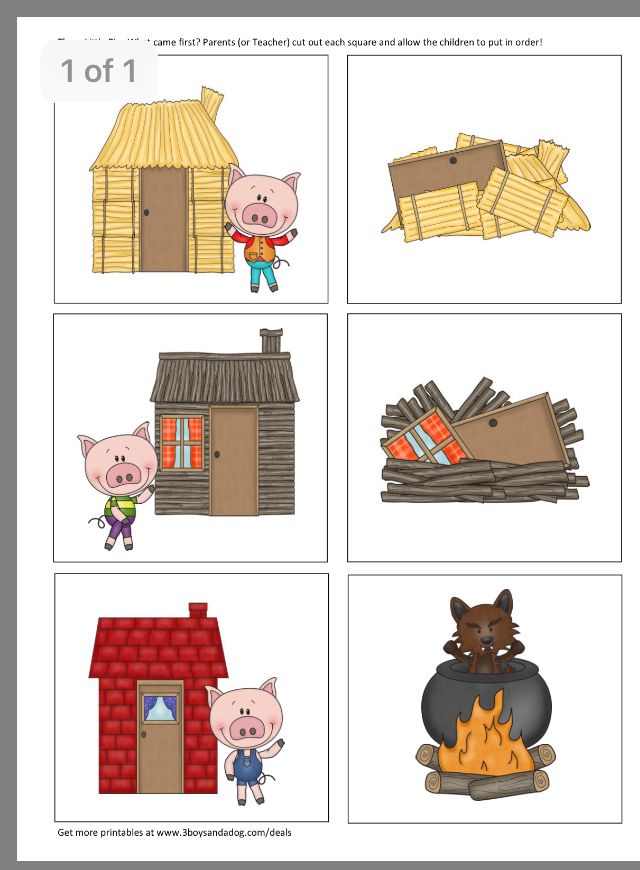 One day the largest said to the other two, "Do you know what I think? I think we had better build a little house, so that the wolf shall not eat us, and meanwhile let us go and look for something to build the house with."
One day the largest said to the other two, "Do you know what I think? I think we had better build a little house, so that the wolf shall not eat us, and meanwhile let us go and look for something to build the house with."
Then the other two said, "Yes, yes, yes! Good! Let us go!"
So they went and found a man who had a load of straw and said to him, "Good man, do us the favor to give us a little of that straw to make a house of, so that the wolf shall not eat us."
The man said, "Take it, take it!" And he gave them as much as they wanted.
The goslings thanked the man and took the straw and went away to a meadow, and there they built a lovely little house, with a door, and balconies, and kitchen, with everything, in short.
When it was finished, the largest gosling said, "Now I want to see whether one is comfortable in this house." So she went in and said, "Oh! How comfortable it is in the house! Just wait!" She went and locked the door with a padlock, and went out on the balcony and said to the other two goslings, "I am very comfortable alone here.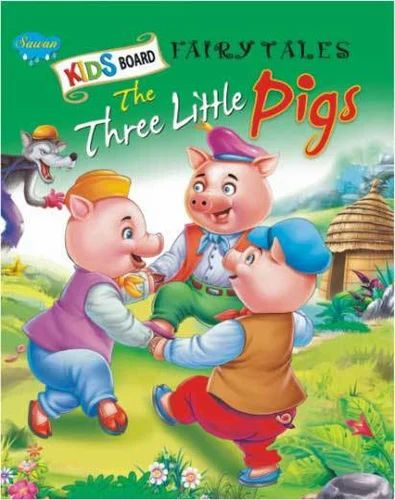 Go away, for I want nothing to do with you."
Go away, for I want nothing to do with you."
The two poor little goslings began to cry and beg their sister to open the door and let them in. If she did not, the wolf would eat them. But she would not listen to them. Then the two goslings went away and found a man who had a load of hay. They said to him, "Good man, do us the kindness to give us a little of that hay to build a house with, so that the wolf shall not eat us!"
"Yes, yes, yes! Take some, take some!" And he gave them as much as they wanted.
The goslings, well pleased, thanked the man and carried the hay to a meadow and built a very pretty little house, prettier than the other. The middle-sized gosling said the smallest, "Listen. I am going now to see whether one is comfortable in this house. But I will not act like our sister, you know!"
She entered the house and said to herself, "Oh! How comfortable it is here! I don't want my sister! I am very comfortable here alone." So she went and fastened the door with a padlock, and went out on the balcony and said to her sister, "Oh! How comfortable it is in this house! I don't want you here! Go away, go away!"
The gosling began to weep and beg her sister to open to her, for she was alone, and did not know where to go, and if the wolf found her he would eat her.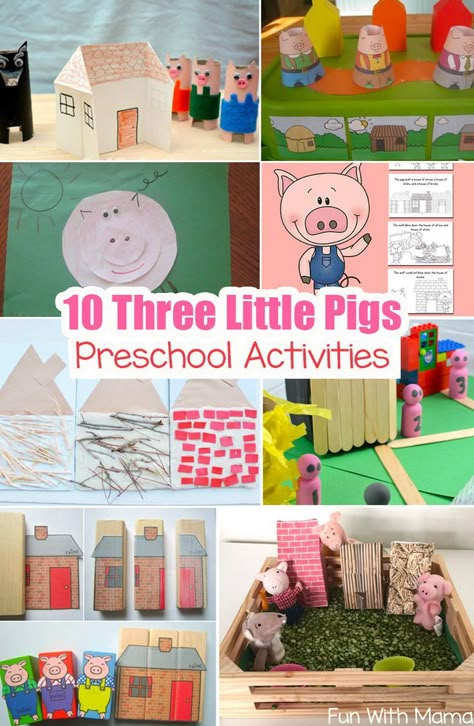 But it did no good. She shut the balcony and stayed in the house.
But it did no good. She shut the balcony and stayed in the house.
Then the gosling, full of fear, went away and found a man who had a load of iron and stones and said to him, "Good man, do me the favor to give me a few of those stones and a little of that iron to build me a house with, so that the wolf shall not eat me!"
The man pitied the gosling so much that he said, "Yes, yes, good gosling, or rather I will build your house for you."
Then they went away to a meadow, and the man built a very pretty house, with a garden and everything necessary, and very strong, for it was lined with iron, and the balcony and door of iron also. The gosling, well pleased, thanked the man and went into the house and remained there.
Now let us go to the wolf.
The wolf looked everywhere for these goslings, but could not find them. After a time he learned that they had built three houses. "Good, good! he said. "Wait until I find you!" Then he started out and journeyed and journeyed until he came to the meadow where the first house was.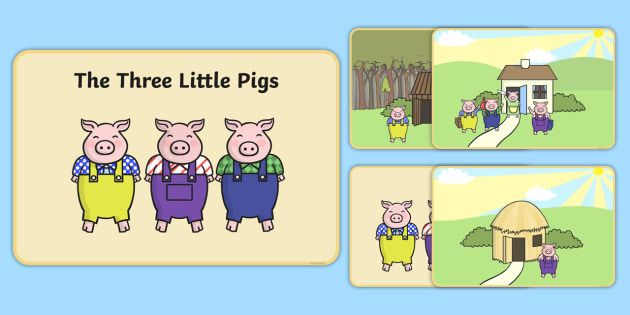 He knocked at the door, and the gosling said, "Who is knocking at the door?"
He knocked at the door, and the gosling said, "Who is knocking at the door?"
"Come, come," said the wolf. "Open up, for it is I."
"The gosling said, "I will not open for you, because you will eat me."
"Open, open! I will not eat you. Be not afraid. Very well, " said the wolf, "if you will not open the door, I will blow down your house." And indeed, he did blow down the house and ate up the gosling.
"Now that I have eaten one," he said, "I will eat the others too." Then he went away and came at last to the house of the second gosling, and everything happened as to the first. The wolf blew down the house and ate the gosling.
Then he went in search of the third, and when he found her he knocked at the door, but she would not let him in. Then he tried to blow the house down, but could not. Then he climbed on the roof and tried to trample the house down, but in vain. "Very well," he said to himself. "In one way or another I will eat you." Then he came down from the roof and said to the gosling, "Listen, gosling.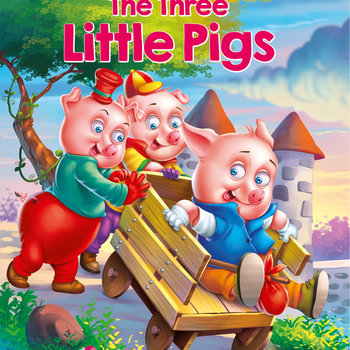 Do you wish us to make peace? I don't want to quarrel with you who are so good, and I have thought that tomorrow we will cook some macaroni, and I will bring the butter and cheese, and you will furnish the flour."
Do you wish us to make peace? I don't want to quarrel with you who are so good, and I have thought that tomorrow we will cook some macaroni, and I will bring the butter and cheese, and you will furnish the flour."
"Very good," said the gosling. "Bring them then."
The wolf, well satisfied, saluted the gosling and went away. The next day the gosling got up early and went and bought the meal and then returned home and shut the house. A little later the wolf came and knocked at the door and said, "Come, gosling, open the door, for I have brought you the butter and cheese!"
"Very well, give it to me here by the balcony."
"No indeed, open the door!"
"I will open when all is ready."
Then the wolf gave her the things by the balcony and went away. While he was gone the gosling prepared the macaroni, and put it on the fire to cook in a kettle full of water. When it was two o'clock the wolf came and said, "Come, gosling, open the door."
"No, I will not open, for when I am busy I don't want anyone in the way.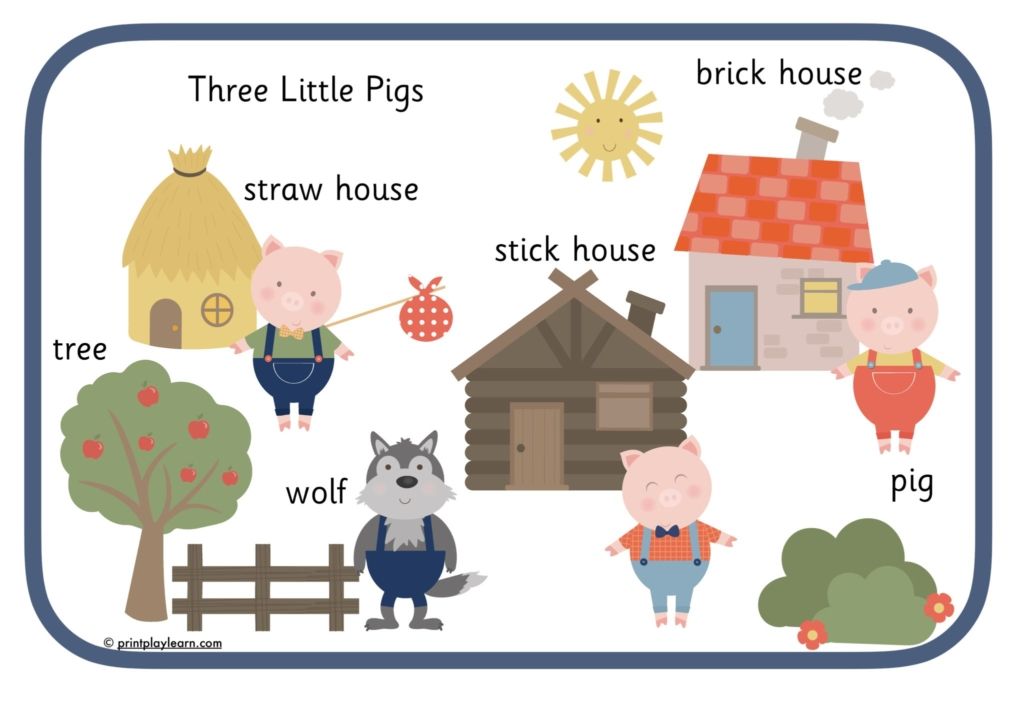 When it is cooked, I will open, and you may come in and eat it."
When it is cooked, I will open, and you may come in and eat it."
A little while after, the gosling said to the wolf, "Would you like to try a bit of macaroni to see whether it is well cooked?"
"Open the door! That is the better way."
"No, no. Don't think you are coming in. Put your mouth to the hole in the shelf, and I will pour the macaroni down."
The wolf, all greedy as he was, put his mouth to the hole, and then the gosling took the kettle of boiling water and poured the boiling water instead of the macaroni through the hole into the wolf's mouth. And the wolf was scalded and killed.
Then the gosling took a knife and cut open the wolf's stomach, and out jumped the other goslings, who were still alive, for the wolf was so greedy that he had swallowed them whole. Then there goslings begged their sister's pardon for the mean way in which they had treated her, and she, because she was kindhearted, forgave them and took them into her house, and there they ate their macaroni and lived together happy and contented.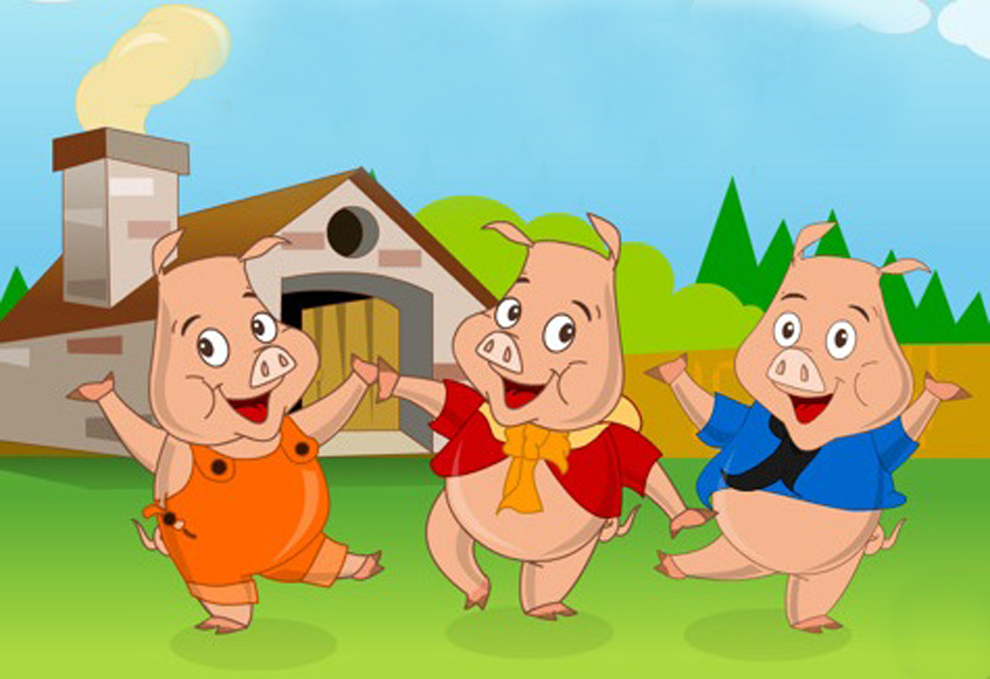
- Source: Thomas Frederick Crane, Italian Popular Tales (London: Macmillan and Company, 1885), no. 86, pp. 267-270.
- Return to the table of contents.
- The Wolf and the Seven Young Kids (Jacob and Wilhelm Grimm), a folktale of Aarne-Thompson-Uther type 123.
Return to D. L. Ashliman's folktexts, a library of folktales, folklore, fairy tales, and mythology.
Revised November 23, 2008.
The Story of the Three Little Pigs
Story Reads: 759,607
Once upon a time there was an old Sow with three little Pigs, and as she had not enough to keep them, she sent them out to seek their fortune.
All three pigs decided to build a house, and set off to the brickworks to buy some bricks.
But soon the three little pigs came across a Man carrying a bundle of straw.
The first little pig said to himself:
“Now I won’t need to walk so far to the brickworks! I’d much rather do less work, and then spend the rest of my afternoon relaxing. ”
”
So the first little pig said to the Man carrying straw:
“Please, Man, give me that straw to build me a house.”
The Man did, and the little Pig quickly built a house with it right where he stood, and then settled down and prepared to have a sleep for the rest of the afternoon.
Presently came along a Wolf, and knocked at the door, and said, “Little Pig, little Pig, let me come in.”
To which the Pig answered, “No, no, by the hair of my chinny chin chin.”
“Then I’ll huff and I’ll puff, and I’ll blow your house in!” said the Wolf.
So he huffed and he puffed, and he blew his house in. Alas! because the house had not been very well made, it fell down, and the wolf was able to eat the little Pig up in an instant.
Meanwhile the second and third Pig were still on their way to the brickworks. When they passed a Man with a bundle of sticks, the second little Pig said to himself:
“Now I won’t need to walk so far to the brickworks! Sticks are stronger than straw – I think they’ll do the job, but anyway, I’m tired now.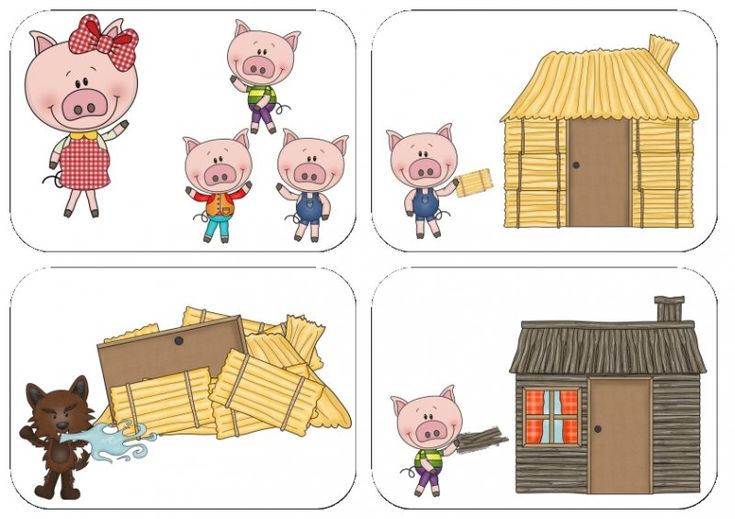 I’d much rather do less work and then spend the rest of my afternoon relaxing.”
I’d much rather do less work and then spend the rest of my afternoon relaxing.”
So the first little pig said to the Man carrying the sticks:
“Please, Man, give me those sticks to build me a house.”
The Man did, and the little Pig quickly built a house with it right where he stood, and then settled down and prepared to have a sleep for the rest of the afternoon.
Then along came the Wolf and said, “Little Pig, little Pig, let me come in.”
“No, no, by the hair of my chinny chin chin.”
“Then I’ll puff and I’ll huff, and I’ll blow your house in!”
So he huffed and he puffed, and he puffed and he huffed, and at last he blew the house down, and ate up the second little Pig.
Finally the third little Pig reached the brickworks, where he met a Man with a load of bricks. He said:
“Please, Man, give me those bricks to build a house with.”
The Man kindly gave him the bricks, and he built his house with them a little way over, carefully, and taking the time to do it well.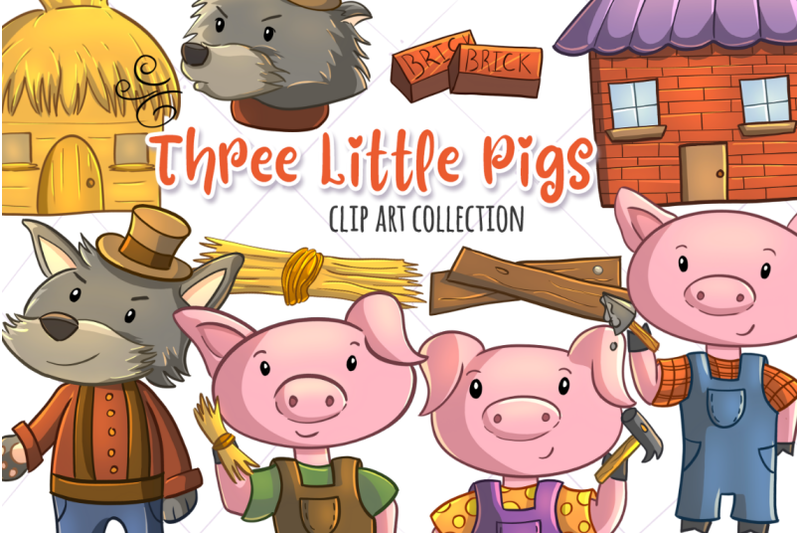
So the Wolf came, as he did to the other little Pigs, and said, “Little Pig, little Pig, let me come in.”
“No, no, by the hair of my chinny chin chin.”
“Then I’ll huff and I’ll puff, and I’ll blow your house in.”
Well, he huffed and he puffed, and he huffed and he puffed, and he puffed and he huffed; but he could not get the house down. When he found that he could not, with all his huffing and puffing, blow the house down, he said, “Little Pig, I know where there is a nice field of turnips.”
“Where?” said the little Pig.
“Oh, in Mr. Smith’s home-field; and if you will be ready to-morrow morning, I will call for you, and we will go together and get some for dinner.”
“Very well,” said the little Pig, “I will be ready. What time do you mean to go?”
“Oh, at six o’clock.”
Well, the little Pig got up at five, and got the turnips and was home again before six. When the Wolf came he said, “Little Pig, are you ready?”
“Ready!” said the little Pig, “I have been and come back again, and got a nice pot-full for dinner.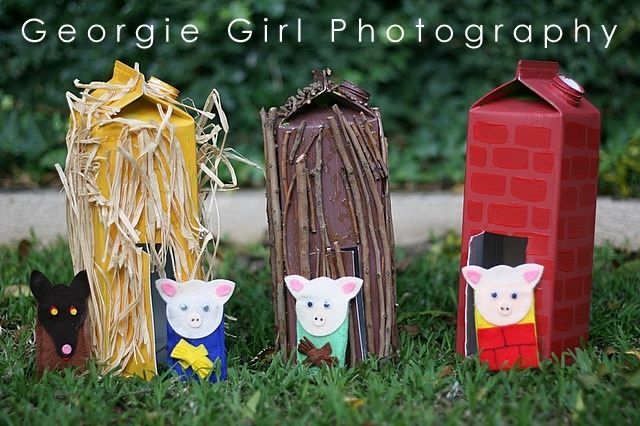 ”
”
The Wolf felt very angry at this, but thought that he would be up to the little Pig somehow or other; so he said, “Little Pig, I know where there is a nice apple-tree.”
“Where?” said the Pig.
“Down at Merry-garden,” replied the Wolf; “and if you will not deceive me I will come for you, at five o’clock to-morrow, and we will go together and get some apples.”
Well, the little Pig woke at four the next morning, and bustled up, and went off for the apples, hoping to get back before the Wolf came; but he had farther to go, and had to climb the tree, so that just as he was coming down from it, he saw the Wolf coming, which, as you may suppose, frightened him very much. When the Wolf came up he said, “Little Pig, what! are you here before me? Are they nice apples?”
“Yes, very,” said the little Pig; “I will throw you down one.” And he threw it so far that, while the Wolf was gone to pick it up, the little Pig jumped down and ran home.
The next day the Wolf came again, and said to the little Pig, “Little Pig, there is a Fair in the Town this afternoon: will you go?”
“Oh, yes,” said the Pig, “I will go; what time shall you be ready?”
“At three,” said the Wolf.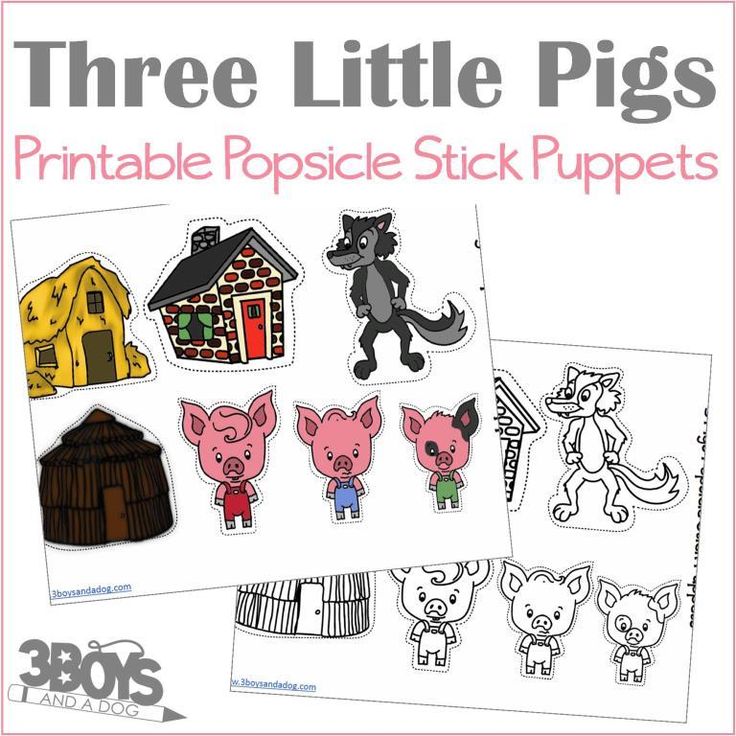
So the little Pig went off before the time, as usual, and got to the Fair, and bought a butter churn, and was on his way home with it when he saw the Wolf coming. Then he could not tell what to do. So he got into the churn to hide, and in doing so turned it round, and it began to roll, and rolled down the hill with the Pig inside it, which frightened the Wolf so much that he ran home without going to the Fair.
He went to the little Pig’s house, and told him how frightened he had been by a great round thing which came down the hill past him.
Then the little Pig said, “Hah! I frightened you, did I? I had been to the Fair and bought a butter churn, and when I saw you I got into it, and rolled down the hill.”
Then the Wolf was very angry indeed, and declared he would eat up the little Pig, and that he would get down the chimney after him.
When the little Pig saw what he was about, he hung on the pot full of water, and made up a blazing fire, and, just as the Wolf was coming down, took off the cover of the pot, and in fell the Wolf.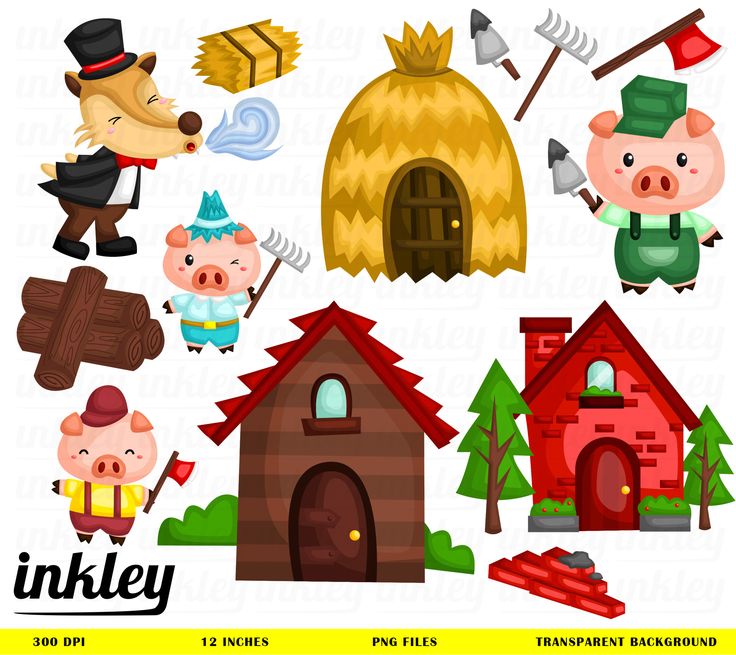 And the little Pig put on the cover again in an instant, boiled him up, and ate him for supper, and lived happy ever after.
And the little Pig put on the cover again in an instant, boiled him up, and ate him for supper, and lived happy ever after.
Adapted from original short story by Unknown
Illustrated by L. Leslie Brooke
Let’s Chat About The Stories ~ Ideas for Talking With Kids
Diligence
1. Why do you think the first two little pigs’ houses blew down, while the third little pig’s didn’t?
2. The third little Pig got up early each morning that the Wolf wanted to do something with him, and did it first. Do you think it’s usually a good thing to do jobs as early as you can, rather than leaving it to the last moment? Why or why not?
3. Does your answer change if, like the first and second little Pigs, you do your jobs earlier, but not as well?
Book Information!
Three Little Pigs - Mikhalkov S. The Tale of the Three Little Pigs.
A fairy tale about three brothers-piglets who built houses for themselves. One brother built a house out of straw, another out of twigs and twigs, and a third out of bricks.
One brother built a house out of straw, another out of twigs and twigs, and a third out of bricks.
Once upon a time there were three little pigs in the world. Three brothers. All of the same height, round, pink, with the same cheerful ponytails. Even their names were similar. The piglets were called: Nif-Nif, Nuf-Nuf and Naf-Naf.
All summer the piglets tumbled in the green grass, basked in the sun, basked in the puddles. But now autumn has come.
- It's time for us to think about winter, - Naf-Naf once said to his brothers, waking up early in the morning. - I'm shivering from the cold. Let's build a house and winter together under one warm roof.
But his brothers didn't want to take the job.
- We'll make it! Winter is still far away. We'll take a walk, - said Nif-Nif and rolled over his head.
— When necessary, I will build a house for myself, — said Nuf-Nuf and lay down in a puddle.
“Me too,” added Nif-Nif.
- Well, as you wish.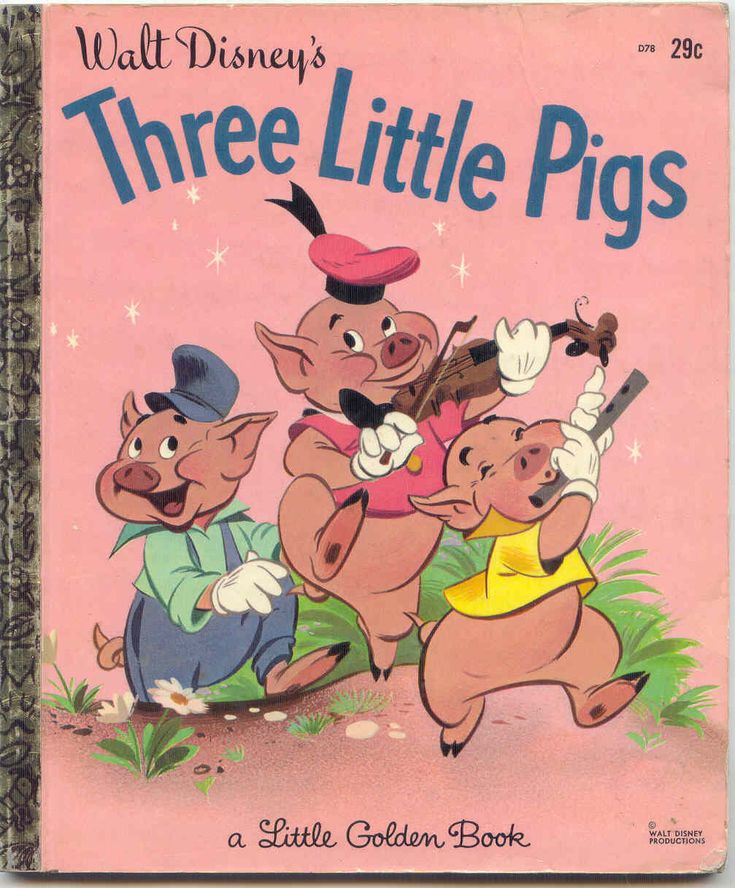 Then I will build my own house, - said Naf-Naf.
Then I will build my own house, - said Naf-Naf.
Nif-Nif and Nuf-Nuf were in no hurry. All they did was play their pig games, jump and roll.
“Today we will take a walk,” they said, “and tomorrow morning we will get down to business.
But the next day they said the same thing.
It was getting colder and colder every day. And only when a large puddle by the road began to be covered with a thin crust of ice in the morning, the lazy brothers finally got to work.
Nif-Nif decided that it would be easier and most likely to make a house out of straw. Without consulting anyone, he did just that. By evening, his hut was ready. Nif-Nif put the last straw on the roof and, very pleased with his house, sang merrily:0003
You'll get around half the world,
You'll get around, you'll get around,
You won't find a better home,
You won't find it, you won't find it!
Singing this song, he went to Nuf-Nuf. Nuf-Nuf, not far away, also built a house for himself. He tried to finish this boring and uninteresting business as soon as possible. At first, like his brother, he wanted to build a house out of straw. But then I decided that it would be very cold in such a house in winter. The house will be stronger and warmer if it is built from branches and thin rods. And so he did. He drove stakes into the ground, intertwined them with rods, heaped dry leaves on the roof, and by evening the house was ready.
He tried to finish this boring and uninteresting business as soon as possible. At first, like his brother, he wanted to build a house out of straw. But then I decided that it would be very cold in such a house in winter. The house will be stronger and warmer if it is built from branches and thin rods. And so he did. He drove stakes into the ground, intertwined them with rods, heaped dry leaves on the roof, and by evening the house was ready.
Nuf-Nuf proudly walked around him several times and sang:
I have a good house,
A new house, a solid house,
I am not afraid of rain and thunder,
Rain and thunder, rain and thunder!
Before he could finish the song, Nif-Nif ran out from behind a bush.
— Well, your house is ready! - said Nif-Nif to his brother. "I told you we'd get it over with quickly!" Now we are free and can do whatever we want!
— Let's go to Naf-Naf and see what kind of house he has built for himself! - said Nuf-Nuf. "We haven't seen him in a long time!"
— Let's go see! Nif-Nif agreed.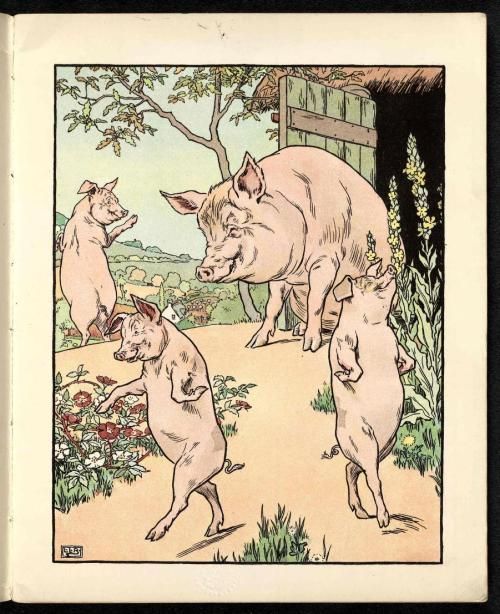
Naf-Naf has been busy building for several days now. He dragged stones, kneaded clay, and now slowly built himself a reliable, durable house in which one could hide from wind, rain and frost. He made a heavy oak door with a bolt in the house so that the wolf from the neighboring forest could not climb up to him.
Nif-Nif and Nuf-Nuf found their brother at work.
— What are you building? - the surprised Nif-Nif and Nuf-Nuf shouted in one voice. - What is it, a pig house or a fortress?
- Piglet's home should be a fortress! Naf-Naf calmly answered them, continuing to work.
— Are you going to fight with someone? Nif-Nif grunted merrily and winked at Nuf-Nuf. And both brothers were so merry that their squeals and grunts carried far across the lawn. And Naf-Naf, as if nothing had happened, continued to lay the stone wall of his house, purring a song under his breath:0007 Won't break through that door!
I'm smarter than everyone, of course,
Smarter than everyone, smarter than everyone!
I build a house from stones,
From stones, from stones!
— What animal is he talking about? - Nif-Nif asked Nuf-Nif.
— What animal are you talking about? - Nuf-Nuf asked Naf-Naf.
- I'm talking about the wolf! - answered Naf-Naf and laid another stone.
- Look how afraid he is of the wolf! - said Nif-Nif.
- What kind of wolves can be here? - said Nif-Nif.
- There are no wolves! He's just a coward! - added Nuf-Nuf.
And both of them began to dance and sing:
We are not afraid of the gray wolf,
Gray wolf, gray wolf!
Where do you go, stupid wolf,
Old wolf, dire wolf?
They wanted to tease Naf-Naf, but he didn't even turn around.
- Let's go, Nuf-Nif, - said then Nif-Nif. “We have nothing to do here!
And two brave brothers went for a walk. On the way they sang and danced, and when they entered the forest, they made such a noise that they woke up the wolf, who was sleeping under a pine tree.
— What's that noise? - the angry and hungry wolf grumbled with displeasure and galloped to the place where the squealing and grunting of two small, stupid pigs could be heard.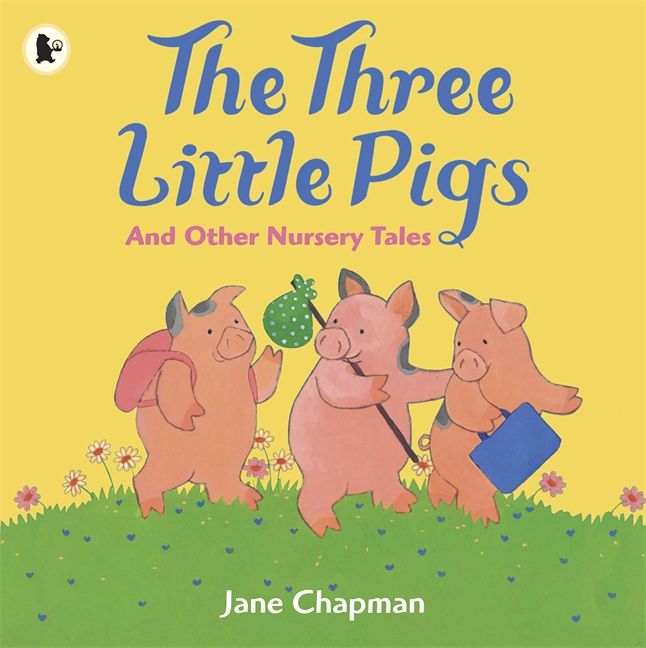
— Well, what kind of wolves can there be! - said at that time Nif-Nif, who saw wolves only in pictures.
- Here we will grab him by the nose, he will know! added Nuf-Nuf, who also had never seen a live wolf.
- Let's knock down, and even tie, and even with a foot like this, like this! Nif-Nif boasted.
And suddenly they saw a real live wolf! He stood behind a large tree, and he had such a terrible look, such evil eyes and such a toothy mouth that Nif-Nif and Nuf-Nuf had a chill running down their backs and thin tails trembled finely. The poor pigs couldn't even move for fear.
The wolf got ready to jump, snapped his teeth, blinked his right eye, but the piglets suddenly came to their senses and, squealing throughout the forest, rushed to their heels.
They have never run so fast! Flashing with their heels and raising clouds of dust, they each rushed to their home.
Nif-Nif was the first to reach his thatched hut and barely managed to slam the door in front of the wolf's very nose.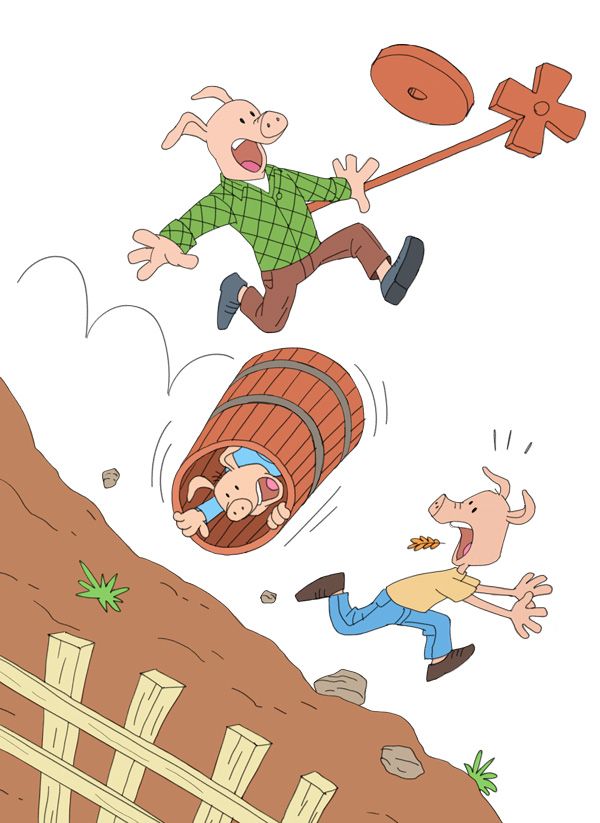
— Unlock the door now! the wolf growled. “Or else I’ll break it!”
— No, — grunted Nif-Nif, — I won't unlock it!
The breath of a terrible beast was heard outside the door.
— Unlock the door now! the wolf growled again. “Otherwise I’ll blow so hard that your whole house will fly apart!”
But Nif-Nif, out of fear, could no longer answer anything.
Then the wolf began to blow: “F-f-f-w-w-w!” Straws flew from the roof of the house, the walls of the house shook. The wolf took another deep breath and blew a second time: “F-f-f-u-u-u-u!”. When the wolf blew for the third time, the house was blown in all directions, as if it had been hit by a hurricane.
The wolf snapped his teeth in front of the little piglet's snout, but Nif-Nif deftly dodged and rushed to run. A minute later he was already at the door of Nuf-Nuf.
As soon as the brothers had locked themselves in, they heard the wolf's voice:
— Well, now I'll eat you both!
Nif-Nif and Nuf-Nuf looked at each other in fear.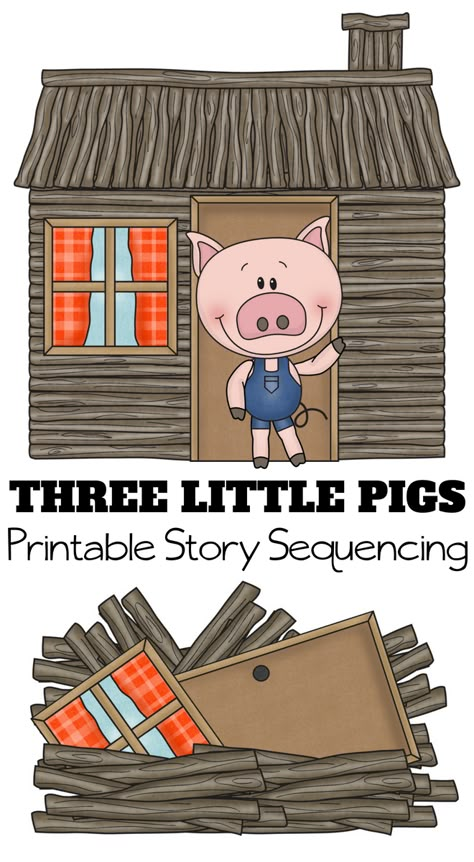 But the wolf was very tired and therefore decided to go for a trick.
But the wolf was very tired and therefore decided to go for a trick.
- I changed my mind! he said so loudly that he could be heard in the house. “I won’t eat those skinny piglets!” I'll go home!
Did you hear? - Nif-Nif asked Nuf-Nif. He said he won't eat us! We are skinny!
- This is very good! - Nuf-Nuf said and immediately stopped trembling.
The brothers became merry and sang as if nothing had happened:
We are not afraid of the gray wolf,
Gray wolf, gray wolf!
Where do you go, stupid wolf,
Old wolf, dire wolf?
But the wolf didn't even think of leaving. He just stepped aside and hunkered down. He had a hard time keeping himself from laughing.
— How cleverly I deceived two stupid little pigs!
When the pigs were completely calm, the wolf took the sheep's skin and cautiously crept up to the house. At the door, he covered himself with skin and knocked softly.
Nif-Nif and Nuf-Nuf were very frightened.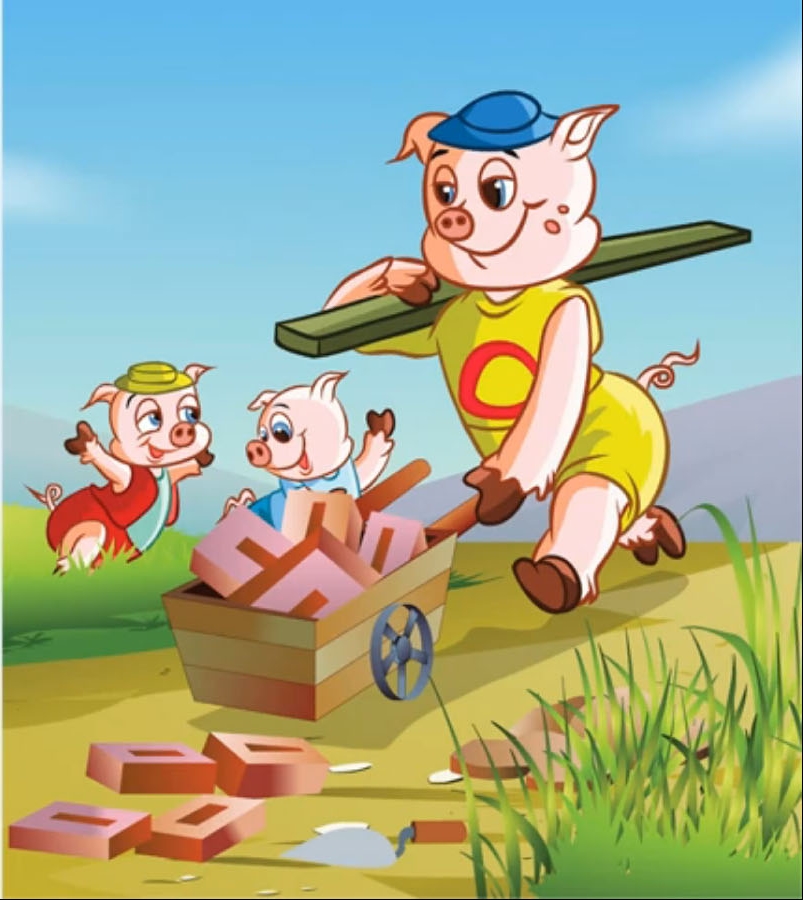
- Who's there? they asked, their tails shaking again.
- It's me, poor little sheep! the wolf squeaked in a thin, alien voice. - Let me spend the night, I strayed from the herd and very, very tired!
- You can let the sheep go! Nuf-Nuf agreed. - A sheep is not a wolf!
But when the pigs opened the door, they saw not a sheep, but the same toothy wolf. The brothers slammed the door and leaned on it with all their might so that the terrible beast could not break into them.
The wolf got very angry. He failed to outsmart the pigs! He threw off his sheepskin and growled:
— Well, wait a minute! There will be nothing left of this house!
And he began to blow. The house leaned a little. The wolf blew a second, then a third, then a fourth time. Leaves flew off the roof, the walls shook, but the house still stood. And, only when the wolf blew for the fifth time, the house staggered and collapsed.
The door alone stood for some time in the middle of the ruins. In horror, the pigs rushed to run. Their legs were paralyzed with fear, every bristle trembled, their noses were dry. The brothers rushed to the house of Naf-Naf.
In horror, the pigs rushed to run. Their legs were paralyzed with fear, every bristle trembled, their noses were dry. The brothers rushed to the house of Naf-Naf.
The wolf caught up with them with huge leaps. Once he almost grabbed Nif-Nif by the hind leg, but he pulled it back in time and added speed.
The wolf also pressed on. He was sure that this time the piglets would not run away from him.
But he was out of luck again. The piglets quickly rushed past a large apple tree without even hitting it. But the wolf did not have time to turn and ran into an apple tree, which showered him with apples. One hard apple hit him between the eyes. A large lump jumped up on the wolf's forehead.
And Nif-Nif and Nuf-Nuf, neither alive nor dead, ran up to Naf-Naf's house at that time. The brother let them into the house and quickly bolted the door.
The poor piglets were so frightened that they could not say anything. They silently rushed under the bed and hid there.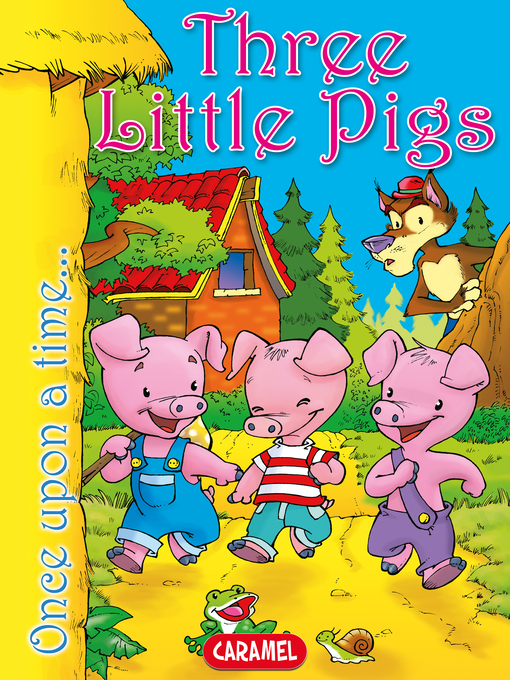
Naf-Naf immediately guessed that a wolf was chasing them. But he had nothing to fear in his stone house. He quickly bolted the door, sat down on a stool and sang:
No animal in the world,
Cunning animal, terrible animal,0007 Will not open this door,
This door, this door!
But just then there was a knock on the door.
- Open without talking! came the rough voice of the wolf.
- No matter how! And don't think! - Naf-Naf answered in a firm voice.
— Oh, yes! Well, hold on! Now I'll eat all three!
- Try it! - answered Naf-Naf from behind the door, not even getting up from his stool. He knew that he and his brothers had nothing to fear in a solid stone house. Then the wolf sucked in more air and blew as best he could!
But no matter how much he blew, not even the smallest stone moved. The wolf turned blue from the effort. The house stood like a fortress. Then the wolf began to shake the door. But the door didn't budge either.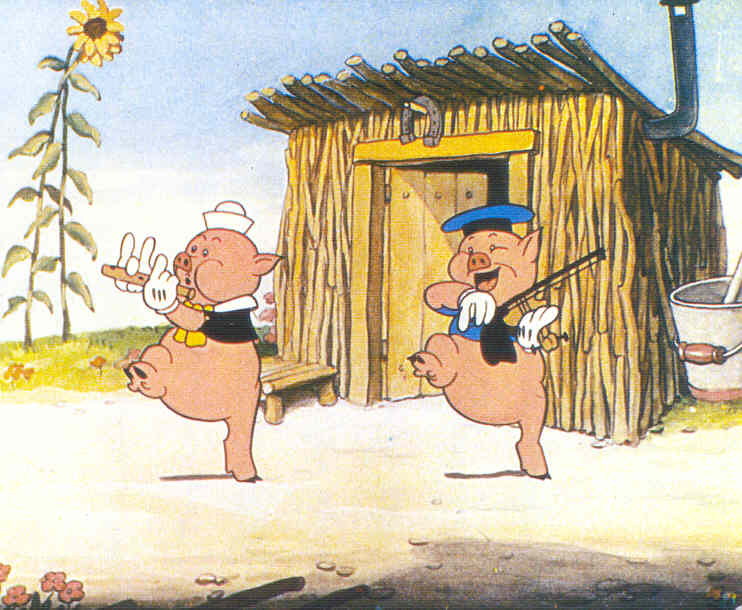 The wolf, out of anger, began to scratch the walls of the house with his claws and gnaw the stones from which they were built, but he only broke off his claws and ruined his teeth. The hungry and angry wolf had no choice but to get out.
The wolf, out of anger, began to scratch the walls of the house with his claws and gnaw the stones from which they were built, but he only broke off his claws and ruined his teeth. The hungry and angry wolf had no choice but to get out.
But then he raised his head and suddenly noticed a large, wide chimney on the roof.
- Yeah! Through this pipe I will make my way into the house! the wolf rejoiced.
He carefully climbed onto the roof and listened. The house was quiet.
I'm still going to eat some fresh pig today! - thought the wolf and, licking his lips, climbed into the pipe.
But as soon as he began to descend the pipe, the piglets heard a rustle. And when soot began to pour on the roof of the boiler, smart Naf-Naf immediately guessed what was the matter. He quickly rushed to the cauldron, in which water was boiling on the fire, and tore off the lid from it.
- Welcome! - said Naf-Naf and winked at his brothers.
The piglets did not have to wait long. Black as a chimney sweep, the wolf flopped right into the cauldron.
Black as a chimney sweep, the wolf flopped right into the cauldron.
His eyes popped out on his forehead, all his hair stood on end.
With a wild roar, the scalded wolf flew back onto the roof, rolled down it to the ground, rolled over its head four times, and rushed into the forest.
And the three brothers, the three little pigs, looked after him and rejoiced that they had so cleverly taught the evil robber a lesson.
No animal in the world,
Won't open this door,
Cunning, scary, scary beast,
Won't open this door!
You will go around half the world,
You will go around, you will go around,
You will not find a better home,
You will not find it, you will not find it!
The wolf from the forest never,
Never, never
Will not come back to us here,
To us here, to us here!
Since then, the brothers began to live together, under one roof.
Illustrator Konstantin Rotov
“Comparative analysis of the English folk tale “The Three little pigs” and its Russian translation by S.
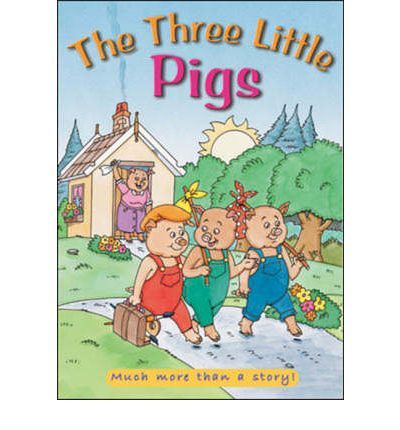 V. Mikhalkov "The Three Little Pigs".
V. Mikhalkov "The Three Little Pigs". CONTENTS
Introduction …………………………………………………………………………………………….... ........2
I. Theoretical part. Fairy tale. Genres of Russian and English folk fairy tales ........................3
II. Practical part. Comparative analysis of English folk tales and their Russian translation ................................................. ................................................. ...................... ......................5
2.1. Common and distinctive features of fairy tales …………... …………………………………………………5
2.2. Linguistic means used in the language of fairy tales …………………………………..7
Conclusion …………………………………… ………………………………………………………........9
III. References …...…………………………………………………………………………...10
Appendix 1. Sociological survey……………………………………………………………...I-II
INTRODUCTION
“The fairy tale is the great spiritual culture of the people,
which we collect by crumbs,
and through the fairy tale
millennial history of the people” AN.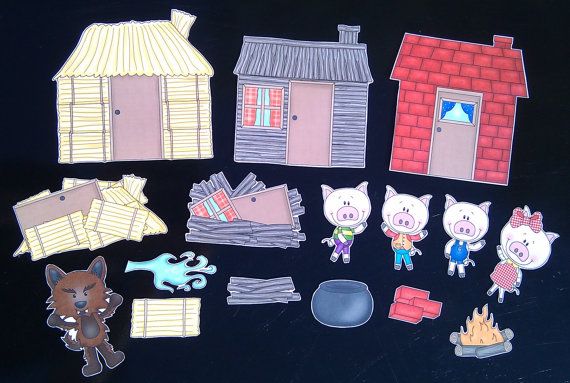 Tolstoy
Tolstoy
A person encounters a fairy tale from the first months of his life. Fairy tales are a genre of oral folk art. Storytelling is old Russian custom, which has survived to this day. The tale is the vault folk wisdom. In ancient times in Russia there were people who cherished, developed, passing on the legacy to the next generation. Storytellers always were respected by the people. Researchers believe that fairy tales exist in all languages, cultures, on all continents. Fairy tales reflect the life of the people, therefore, fairy tales that appeared in different parts of the world differ significantly theme, structure. The way of life was influenced by natural conditions, geographical the position of the country. Thus, fairy tales are closely related to the objects surrounding a person. and phenomena.
Relevance research is that a fairy tale plays an important role in human life, especially a child. It forms the ability to distinguish between good and evil, develops creative thinking.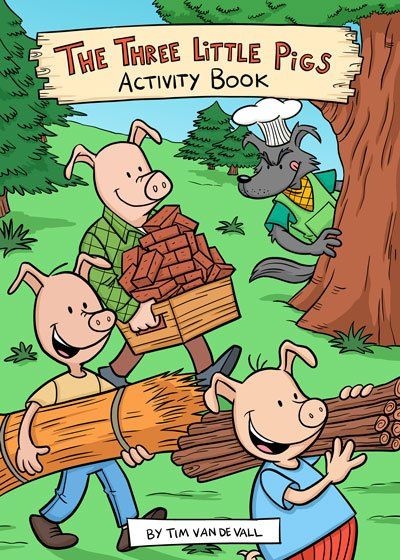 The study of the features of the construction of fairy tales in English and Russian languages will contribute to the formation of a linguistic picture of the world, since Fairy tale characters often behave in the same way as real representatives of fairy tales. a certain culture. The relevance of our study was confirmed by sociological survey.
The study of the features of the construction of fairy tales in English and Russian languages will contribute to the formation of a linguistic picture of the world, since Fairy tale characters often behave in the same way as real representatives of fairy tales. a certain culture. The relevance of our study was confirmed by sociological survey.
Purpose of this work: to compare the construction features English and Russian fairy tales. In accordance with the goal, the following tasks are formulated:
1. define and describe fairy tale genres;
2. highlight the main characteristics of English folk tales;
3. set general and distinctive features of the construction of fairy tales;
4. conduct a survey among classmates;
5. highlight linguistic means used in the language of fairy tales.
A hypothesis was put forward : suppose that the ways of constructing English and Russian fairy tales and used in them, the linguistic means in English and Russian are different.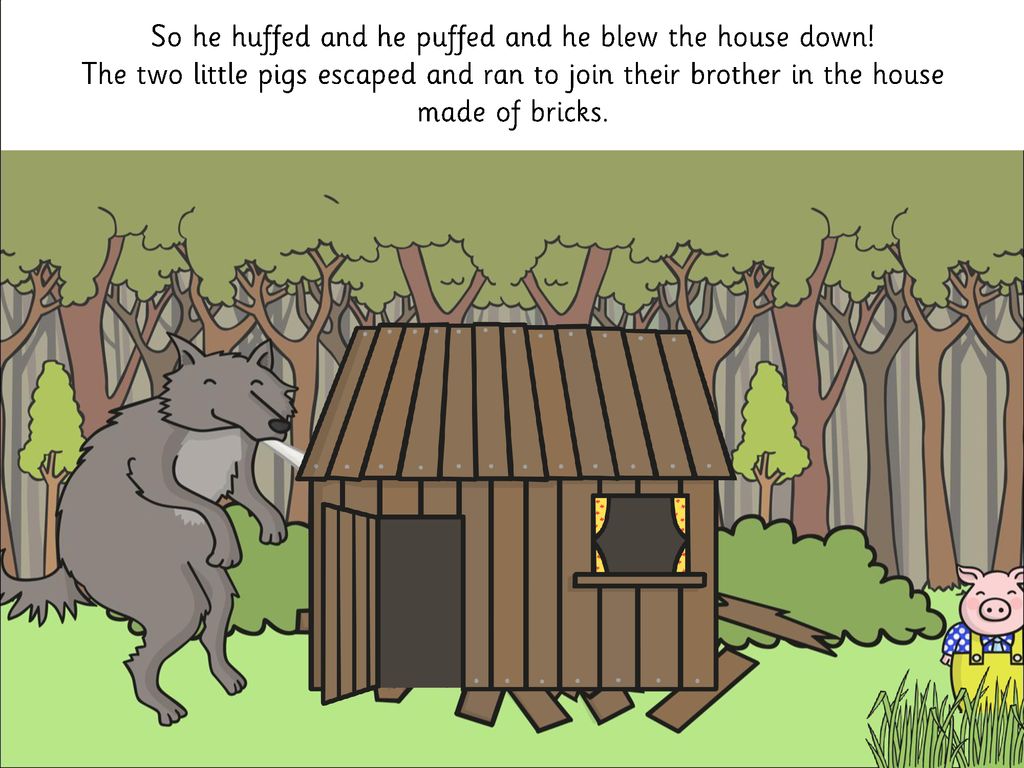
Research object : English folk tale "Three little pigs" and its Russian translation by S.V. Mikhalkov "The Three Little Pigs". Subject research: general and distinctive features of the language of Russian and English fairy tales.
An English folk tale served as the material for research and its translation into Russian by S.V. Mikhalkov.
the following research methods : research: search and extraction of information on this issue, systematization of the information received, taking notes, highlighting the main thing, putting forward a hypothesis, analyzing literary sources and resources of the Internet. Social method (method of collecting social information) - sociological survey, contextual analysis, interpretation, generalization and classification of the analyzed material. When analyzing the actual material the comparative method was used - (from lat. comparatius) comparative.
Practical significance work lies in the fact that the results obtained can be used on lessons of literature and English, in the work of the school theater.
I. Theoretical part. Story. Genres of Russian and English folk tales
Collect and research fairy tales began in the 18th century, although talented storytellers appeared long before this. Before the appearance of the word "fairy tale", there were concepts of "bike", "fable", which came from "bat" - "to tell". The first mention of this term found in the charter of the governor Vsevolodsky, which refers to the condemnation of people, who "told unprecedented tales." However, scientists believe that among the people the word "fairy tale" was used before.
Consider existing definitions the concept being studied. The Great Soviet Encyclopedia gives the following definition: « fairy tale , one of the main genres oral folk poetry, epic, predominantly prose work of fiction of magical, adventurous or everyday nature with an installation for fiction" [9]. According to N.Yu. Russova, " fairy tale predominantly prose fictional story magical, adventurous or everyday nature with a fantasy setting fiction" [9].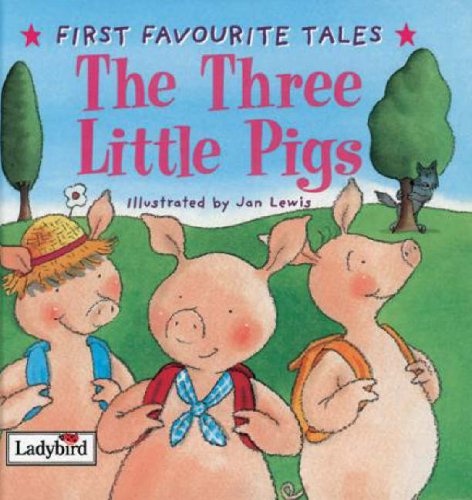 In the dictionary of literary terms, the term folk tale is used in a broad sense as "any oral story communicated to listeners for entertainment purposes" [5]. We will adhere to our work definitions N.Yu. Russova.
In the dictionary of literary terms, the term folk tale is used in a broad sense as "any oral story communicated to listeners for entertainment purposes" [5]. We will adhere to our work definitions N.Yu. Russova.
According to the principle of the origin of a fairy tale can be divided into folklore (folk) and literary. The first are epic genre of written and oral folk art, "prosaic an oral story about fictitious events in the folklore of different peoples” [6]. Second oriented to fiction, closely related to folk tales, but belong to specific author. The characteristic of a literary tale is the fact that it prior to publication, did not exist orally and had no variants. In our The work deals with the English folk tale "The Three little pigs" and Russian translation by S.V. Mikhalkov "The Three Little Pigs". Since the original story already existed, we cannot consider its Russian version a literary tale. There are several varieties of folk tales: fairy tales about animals, magic and household tales. The object of a folk tale about animals all living things in the world act: wild and domestic animals, birds and fish, objects, plants and natural phenomena. Depicting nature, the fairy tale endowed animals and plants with human features, attributed to them the actions of people: animals and birds talking, arguing, arguing with each other. Behind every hero of fairy tales fixed image. The structure of a Russian fairy tale consists of a beginning, the main part and the ending, clichés are used. Talking about magic fairy tale, V.Ya. Propp gave the following typological characteristics: “This is the world impossible and invented…”, “…In the Russian fairy tale there is not a single plausible plot…”, “…First of all, she attracts with the unusualness of her story…”, “... That which was not and could never be, is told, however, in such a way ... as like it actually happened" [8]. Household fairy tales reproduce everyday life, in which positive characters fight with negative ones. Decency, honesty resist lies, greed and envy, but in the end good conquers evil.
The object of a folk tale about animals all living things in the world act: wild and domestic animals, birds and fish, objects, plants and natural phenomena. Depicting nature, the fairy tale endowed animals and plants with human features, attributed to them the actions of people: animals and birds talking, arguing, arguing with each other. Behind every hero of fairy tales fixed image. The structure of a Russian fairy tale consists of a beginning, the main part and the ending, clichés are used. Talking about magic fairy tale, V.Ya. Propp gave the following typological characteristics: “This is the world impossible and invented…”, “…In the Russian fairy tale there is not a single plausible plot…”, “…First of all, she attracts with the unusualness of her story…”, “... That which was not and could never be, is told, however, in such a way ... as like it actually happened" [8]. Household fairy tales reproduce everyday life, in which positive characters fight with negative ones. Decency, honesty resist lies, greed and envy, but in the end good conquers evil.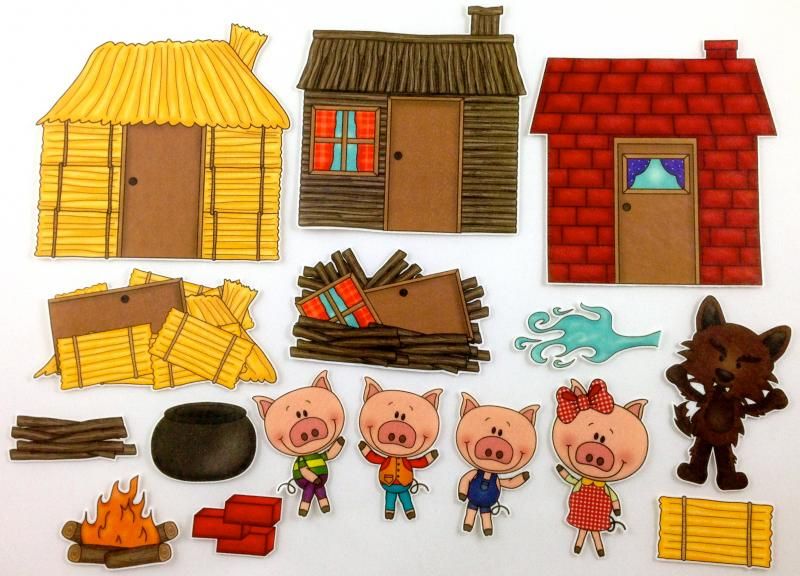 The heroes of everyday fairy tales are a peasant, a soldier, shoemaker who live in a real world and fight with the master, priest, general.
The heroes of everyday fairy tales are a peasant, a soldier, shoemaker who live in a real world and fight with the master, priest, general.
Genre originality of Russian and English fairy tales is the same, but there are a number of internal differences. Consider the distinctive features English folk tale. English fairy tales about animals are not large in volume. Positive protagonists are a cat and a chicken, negative - a fox and a wolf. Missing in fairy tales morality, but they teach to empathize with weak heroes, to help them. humor is an integral part of the English fairy tale, he "softens the acute situations - characters and their qualities are ridiculed and presented in a comical way" [7]. The space of fairy tales about animals is limited from reality. For example, in the fairy tale "Three little pig" shows typical features of English folklore tales about animals: the presence of an evil hero (wolf), a cunning hero (the third pig), magical the number "three" (as in Russian fairy tales).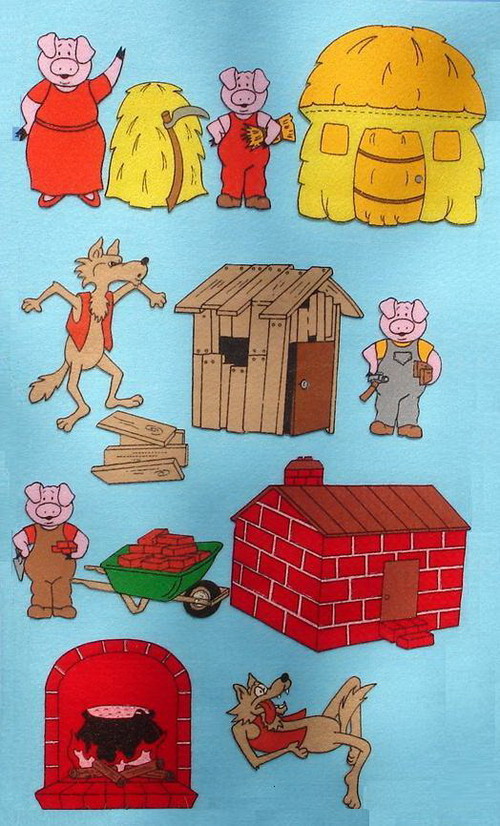 In search of happiness, animals have to overcome difficulties, but as a result, good triumphs over evil. Almost absent in English fairy tales traditional beginnings and endings. The ending of a fairy tale can be abrupt or even cruel. “But often the denouement is taken for granted, harmonious completion, in which there is no sharp rise or surge” [6].
In search of happiness, animals have to overcome difficulties, but as a result, good triumphs over evil. Almost absent in English fairy tales traditional beginnings and endings. The ending of a fairy tale can be abrupt or even cruel. “But often the denouement is taken for granted, harmonious completion, in which there is no sharp rise or surge” [6].
Sometimes the main characters of fairy and everyday English fairy tales cope with the situation alone, which illustrates the Western type strong hero. Unlike the Russian hero of fairy tales, English prefers avoid trouble. “They are not trying to achieve something, they are trying to avoid failure, loss ... The activities of the main characters are due not only to their own desires, but also duty, external circumstances” [7]. Sometimes the hero is a contemplative, outsider an observer who follows events, not a doer. "Intellectualism" far from the most faithful companion of English fairy tales. Stupidity and impracticality can coexist harmoniously with benevolence, morality and decency within one English character, which would be perfectly unthinkable for a Russian folk tale" [6].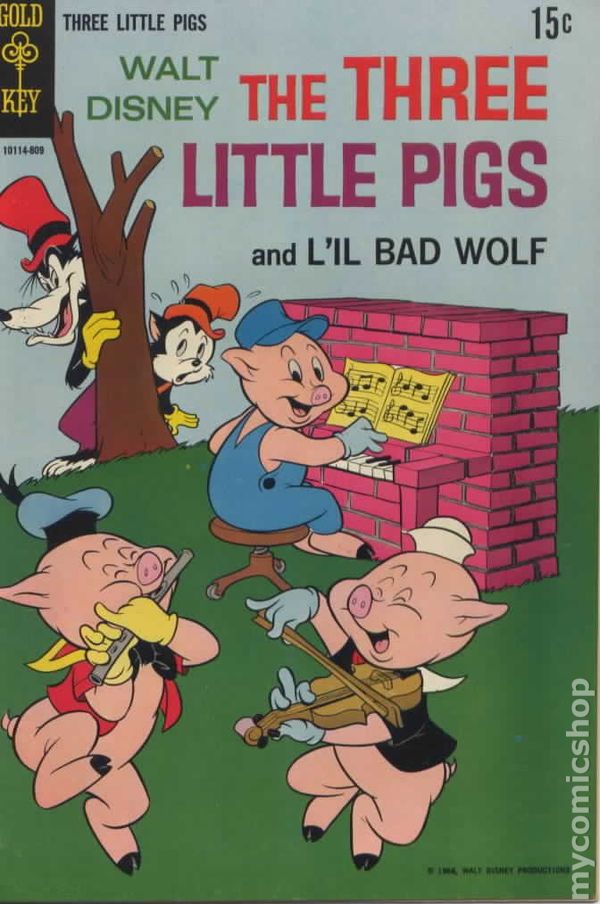 "Heroes some fairy tales are hardworking, honest, noble and courageous; some of them become real folk heroes. Heroes of other English fairy tales always virtuous, they are capable of trickery and deceit, although they differ enterprise and energy - traits of character that were valued in the bourgeois England, where capitalism began to develop for the first time in the world” [8]. A characteristic feature of the English tale is its information richness. Often magic is replaced by concrete facts, figures, geographical names. The reader may have the impression that the purpose of a fairy tale is to convey certain information, to describe reality.
"Heroes some fairy tales are hardworking, honest, noble and courageous; some of them become real folk heroes. Heroes of other English fairy tales always virtuous, they are capable of trickery and deceit, although they differ enterprise and energy - traits of character that were valued in the bourgeois England, where capitalism began to develop for the first time in the world” [8]. A characteristic feature of the English tale is its information richness. Often magic is replaced by concrete facts, figures, geographical names. The reader may have the impression that the purpose of a fairy tale is to convey certain information, to describe reality.
Having examined the characteristic features of the English and Russian folk fairy tales, we identified features associated with different genres of fairy tales: we described the structure of the construction of fairy tales, the main characters. In the next part of the work let us dwell on the consideration and comparison of the English folk tale "Three little pigs” and Russian translation by S.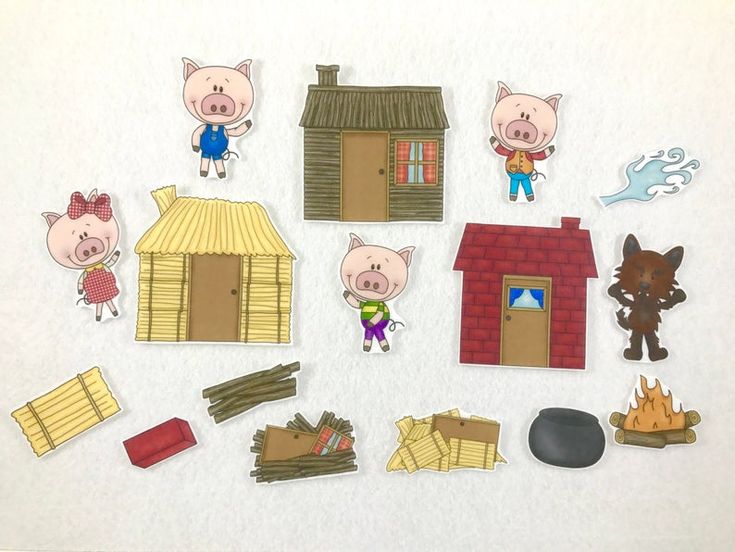 V. Mikhalkov “The Three Little Pigs”.
V. Mikhalkov “The Three Little Pigs”.
II. Practical part. Comparative analysis of an English folk tale and its Russian translation
2.1. General and distinctive features of fairy tales
English folk fairy tale "The Three Little Pigs" (English The Three Little Pigs ) is one of the most popular children's stories. Russian children are well aware of the translation of the fairy tale by S.V. Mikhalkov. The plot of The Three Little Pigs comes from English folklore; literary versions of The Three Little Pigs have been known since the 19th century and are included, in particular, in the book "Nursery Rhymes and Nursery Tales" published in London in 1843 by James Holywell-Phillips, known to us in the transcription American journalist and writer Joel Harris as "The Tales of Uncle Remus" (Atlanta, 1881). We read fairy tales and compared the main elements the content of these stories.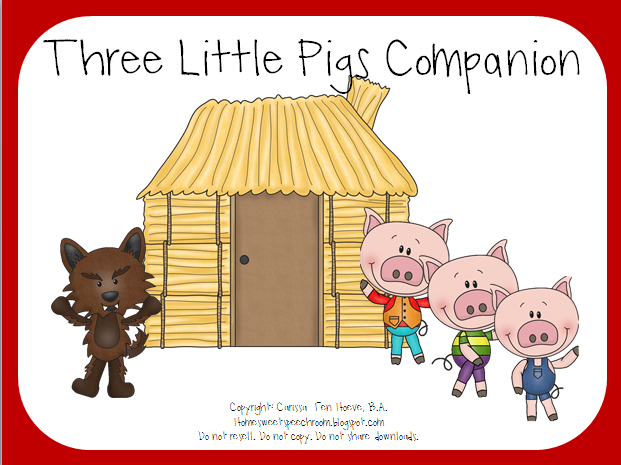
COMPARATIVE CHARACTERISTICS OF THE ELEMENTS CONTENTS OF FAIRY TALE
Elements of a fairy tale | Three PIGS | THE THREE LITTLE PIGS |
Main characters (names) | 3 pigs: Nif-Nif, Nuf-Nuf, Naf-Naf, wolf | 3 little pigs, mother pigs, men, the wolf |
Piglet actions | Build huts/houses: Nif-Nif lives in a straw hut, Nuf-Nuf lives in a hut made of branches, Naf-Naf lives in a stone house. They go for a walk, somersault in the green grass, bask in the sun, sing songs and dance, run away from the wolf | Houses are being built: 1 piglet lives in a straw house, 2 in a gorse house, 3 in a brick house. |
Wolf actions | Jumping, snapping his teeth, blinking his right eye, blowing on piglets' houses, dressing in sheep's clothing, scratching the walls of the house with his claws and gnawing stones, descending the chimney | Blows on houses, eats pigs, goes down the chimney |
Location | 2 huts (1 house) piglets | 3 pig houses |
Data show that presented in the table, between the English fairy tale and its Russian translation there are a number of differences in content. Let's describe some of them. In the fairy tale by S.V. Mikhalkov, piglets are called Nif-Nif, Nuf-Nuf, Naf-Naf. Unlike their careless juniors brothers (in Mikhalkov's version - Nif-Nifa and Nuf-Nufa), piglet Naf-Naf has an enviable forethought.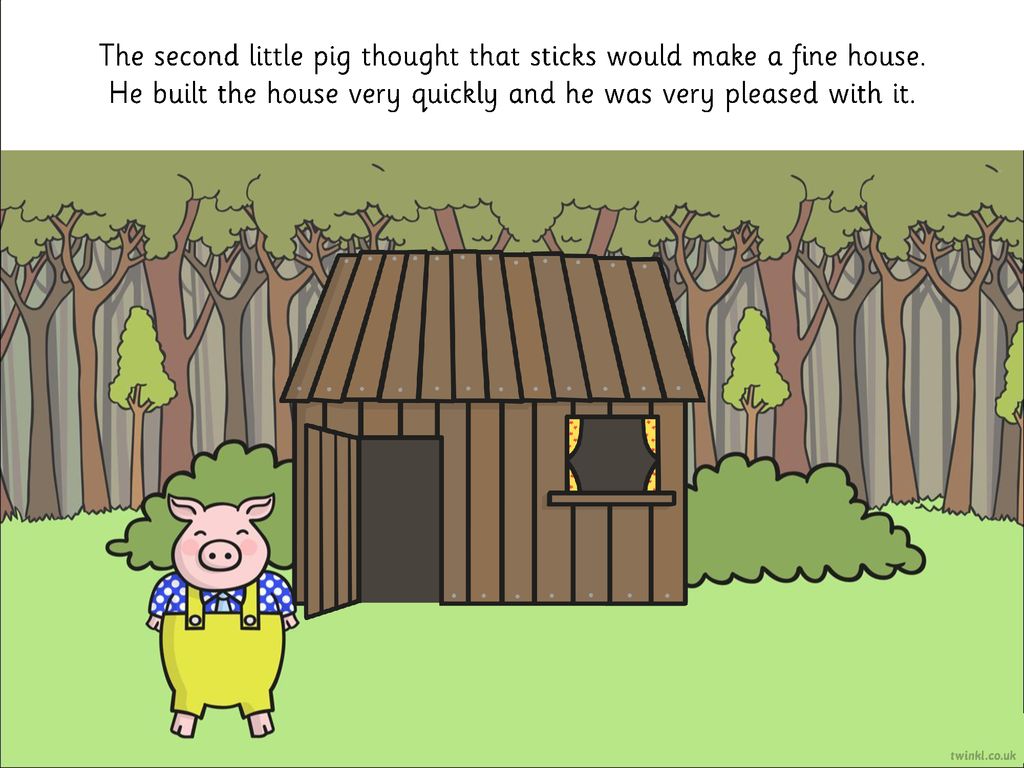 Sparing no effort, he builds himself a real stone house (in while the brothers limited themselves to a thatched and wooden hut). And when angry the insidious Wolf, hungry for fresh pork, easily destroys the dwellings of Nif-Nif and Nuf-Nuf, it is the house Naf-Naf that becomes a reliable refuge for all three pigs. In the English version, the piglets do not have names. But only the most cunning and intelligent of the pigs defeats the wolf and stays alive. Piglets actions and the wolf in the Russian fairy tale are described in more detail and more colorful than in the English one. To besides, in the Russian fairy tale the piglets build huts, in the English fairy tale they build houses! This is due to the typical type of dwelling. British and Russians. In Russian villages, people traditionally lived in small wooden houses (huts). The British house consisted of two floors. Consider features of the composition of English and Russian fairy tales.
Sparing no effort, he builds himself a real stone house (in while the brothers limited themselves to a thatched and wooden hut). And when angry the insidious Wolf, hungry for fresh pork, easily destroys the dwellings of Nif-Nif and Nuf-Nuf, it is the house Naf-Naf that becomes a reliable refuge for all three pigs. In the English version, the piglets do not have names. But only the most cunning and intelligent of the pigs defeats the wolf and stays alive. Piglets actions and the wolf in the Russian fairy tale are described in more detail and more colorful than in the English one. To besides, in the Russian fairy tale the piglets build huts, in the English fairy tale they build houses! This is due to the typical type of dwelling. British and Russians. In Russian villages, people traditionally lived in small wooden houses (huts). The British house consisted of two floors. Consider features of the composition of English and Russian fairy tales.
COMPARATIVE CHARACTERISTICS OF THE COMPOSITION FAIRY TALE
Fairy tale elements | The Three Little Pigs | THE Three little pigs |
| Beginning (beginning of a fairy tale) | Once upon a time there were three little pigs in the world. | THERE was once a mother pig who had three little pigs. |
| Climax (highest tension point) | The wolf destroyed the houses of Nif-Nif and Nuf-Nuf. The piglets ran to their brother for salvation | After the wolf dealt with two piglets, he came to the 3rd piglet and tried to compete with him. |
| Decoupling (end of action). | The three little pigs drove off the bad wolf | The cunning pig boiled the evil wolf |
Magic numbers | Three little pigs, three houses. | Three little pigs, three houses. |
As the results show analysis, the compositional components of English and Russian fairy tales are similar. However there are also slight differences in the completion of the action. So, piglets in a Russian fairy tale unite and defeat an evil wolf together, and in English fairy tale - only the smartest and most cunning survive and defeat the evil wolf piglet. At the end of the English tale, the future actions of the piglet are also described: he lived and lived happily in his brick house.
However there are also slight differences in the completion of the action. So, piglets in a Russian fairy tale unite and defeat an evil wolf together, and in English fairy tale - only the smartest and most cunning survive and defeat the evil wolf piglet. At the end of the English tale, the future actions of the piglet are also described: he lived and lived happily in his brick house.
2.2. L linguistic means used in the language of fairy tales
In this part of the work will be described linguistic means used in the language of the English fairy tale and its Russian translation. The events of fairy tales are transmitted using lexical and syntactic funds. Lexical means are represented by epithets, comparisons, lexical repetitions. We will call the epithet “one of figurative poetic means - a definition attached to the title subject for greater figurativeness” [Ushakov D.N. Explanatory dictionary of the Russian language: [website].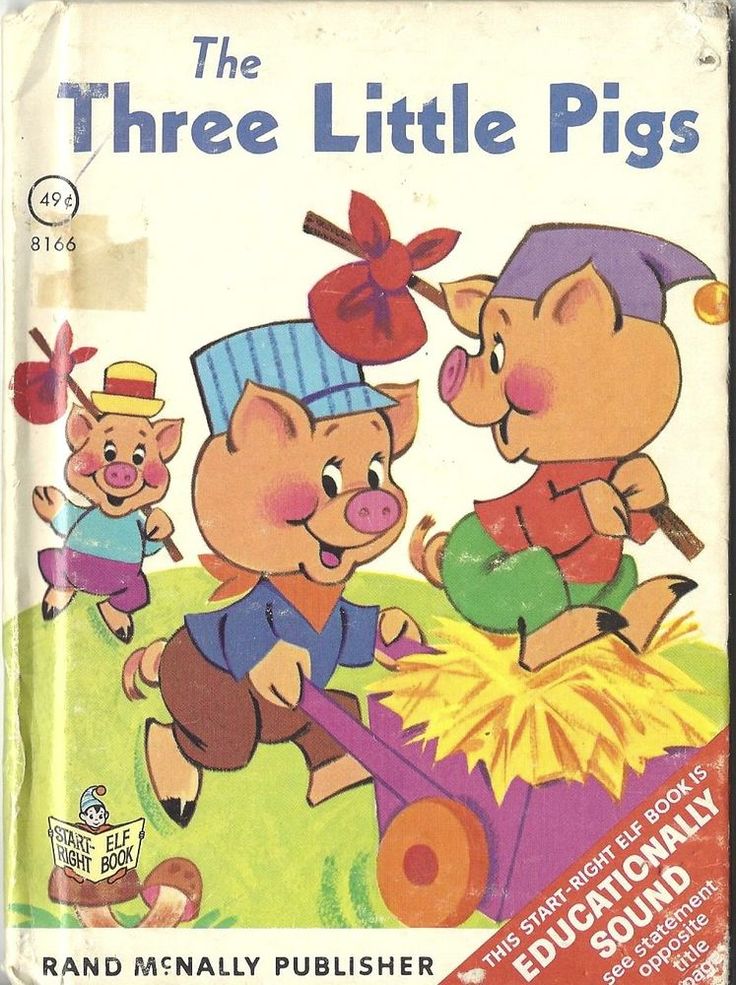 URL: dic.academic.ru]. These tropes have a high degree of expressiveness, show the author's vision of the world, figuratively characterize an object, a phenomenon. According to I.R. Halperin, “through the epithet, the desired reaction to the statement with side of the reader” [Galperin, 2012: 115]. Comparison - matching one object with another in order to create an artistic description of the first - contributes to the identification, in addition to the main, additional features of the described concepts.
URL: dic.academic.ru]. These tropes have a high degree of expressiveness, show the author's vision of the world, figuratively characterize an object, a phenomenon. According to I.R. Halperin, “through the epithet, the desired reaction to the statement with side of the reader” [Galperin, 2012: 115]. Comparison - matching one object with another in order to create an artistic description of the first - contributes to the identification, in addition to the main, additional features of the described concepts.
To syntactic means, used in the language of the analyzed fairy tales include the following: polyunion (polysyndeton), repetition of a syntactic construction, non-union (asyndeton). Repetition is a literary device in which the repetition of syntactic structures in a certain order. Polyunion is repetition unions, when homogeneous members of a sentence are connected by one union. Under the term “parallelism” will be understood as “similar syntactic construction of two (or more) sentences or other fragments of text" [Terminological dictionary of literary criticism: [website].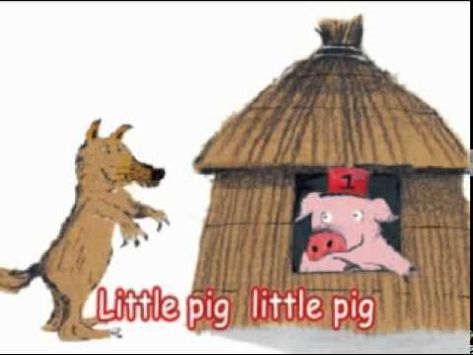 URL: literaturologiya.academic.ru]. “Unionlessness is a stylistic figure that consists in the omission of alliances with in order to enhance the expression of speech "[Explanatory Dictionary of Foreign Words: [website]. URL: http://slovari.yandex.ru]. This stylistic gives the expression dynamism and swiftness. Skipping unions with long transfers helps to create the effect of a rapid change of pictures, emphasizes the richness of individual private impressions within the general paintings.
URL: literaturologiya.academic.ru]. “Unionlessness is a stylistic figure that consists in the omission of alliances with in order to enhance the expression of speech "[Explanatory Dictionary of Foreign Words: [website]. URL: http://slovari.yandex.ru]. This stylistic gives the expression dynamism and swiftness. Skipping unions with long transfers helps to create the effect of a rapid change of pictures, emphasizes the richness of individual private impressions within the general paintings.
COMPARATIVE SPECIFICATIONS LINGUISTIC TOOLS
linguistic tool | The Three Little Pigs | THE three little pigs |
| Comparisons | Black, as Chimney Sweep, Wolf splashed right into the boiling water. | - |
| Epithets | pig games, round, pink, matching fun ponytails. gray clouds; reliable, durable house. Cunning beast, terrible beast, stupid wolf. Old wolf, dire wolf, angry and hungry wolf, toothy mouth, thin tails, skinny piglets; stupid, little pigs; poor little sheep. Poor pigs, rough voice, smart and brave brother, scalded wolf | little pigs, a nice little straw house, chinny chin, nice field of turnips, nice apple-tree, a great round thing |
| multi-union (Polysyndeton ) | The wolf, out of anger, began to scratch the walls of the house with his claws and gnaw stones from which they were built, but he only broke off his claws and ruined his teeth. On the way they sang and danced, and when they entered the forest, made a noise, that they woke up the wolf, who was sleeping under the pine tree. | "Then I'll huff and I'll puff, and I'll blow your house in." So he huffed and he puffed and he blew the house in and ate up the little pig. At six tomorrow morning I'll call for you 6 and we'll go together and get some turnips for dinner." |
Repeats | 1.- At least half the world will go around, You will go around, you will go around, You won't find a better home, You won't find it, you won't find it! 2. I am not afraid of rain and thunder, Rain and thunder, rain and thunder! 3. Of course, I am smarter than everyone, Smarter than everyone, smarter than everyone! I build a house of stones, From stones, from stones! No animal in the world, Cunning beast, terrible beast, Will not break through this door, This door, this door! 4. Gray wolf, gray wolf! 5. Won't open this door, This door, this door! 6. Wolf from the forest never, Never never Will not return to us here, To us here, to us here! | Design repeat: "No, no, by the hair on my chinny chin chin." "Little pig, little pig, let me come in." "Then I'll huff and I'll puff, and I'll blow your house in. So he huffed and he puffed and he blew the house in and ate up the little pig |
| non-union (Asindeton) | All summer they tumbled in the green grass, warmed themselves on the sun, basking in the puddles. The sun was no longer so hot, gray clouds stretched over the yellowed forest. From fear, their legs were taken away, each bristles quivered, noses dried up. His eyes popped out on his forehead, all his hair stood up on end. | - |
To describe the main epithets are used for heroes, household items. Russian language fairy tales contain more means than the language of an English fairy tale. For example, for the image of piglets, a wolf, weather, dwelling, a large the number of epithets in a Russian fairy tale, while in an English one with the help of epithets a description of the place, objects is given. Comparisons both in the English fairy tale and in Russian fairy tales are practically not used. So the trails help the reader to present the image of the heroes of a fairy tale, draw a picture of the life of animals. interesting the use of allied connection in the last sentences of fairy tales is presented. English the language is not characterized by the frequent presence of an allied connection, namely the union "and". Nonetheless, in proposals Then I'll huff and I'll puff, and I'll blow your house in." So he huffed and he puffed and he blew the house in and ate up the little pig « union used several once.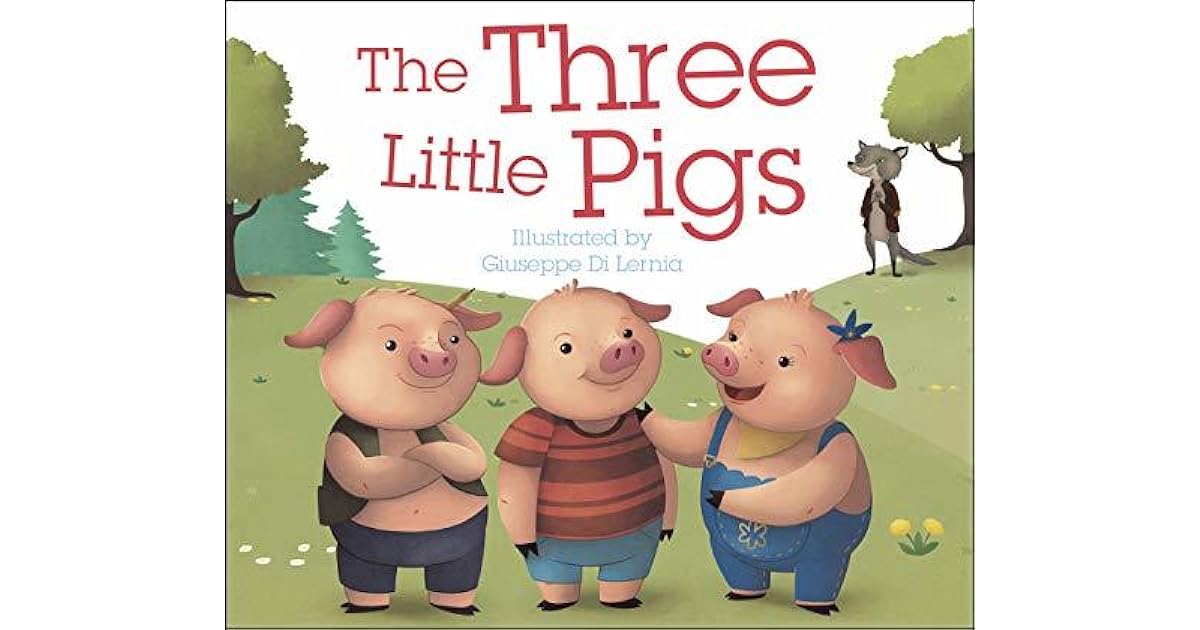 The technique focuses the reader's attention on the actions of the main characters. wolf in Russian fairy tale overcomes a series of obstacles before reaching the piglets. A number of unions emphasize these "obstacles". A characteristic feature of both tales is the use of repetitions of whole sentences. Thus, the statements of the wolf about that he will blow away the house is repeated several times.
The technique focuses the reader's attention on the actions of the main characters. wolf in Russian fairy tale overcomes a series of obstacles before reaching the piglets. A number of unions emphasize these "obstacles". A characteristic feature of both tales is the use of repetitions of whole sentences. Thus, the statements of the wolf about that he will blow away the house is repeated several times.
Conclusion
characterization of the English folk tale "The Three little pigs" and its Russian translation by S.V. Mikhalkov "The Three Little Pigs".
In the first chapter of the work, we described the main stages of the study fairy tales, gave a definition of the concept and considered genres. We call a fairy tale predominantly a prose fictional account of a magical, adventurous, or everyday character with a fantasy setting. Fairy tales are divided into folklore (about animals, magical and domestic) and literary. The object of the folk tale about animals is all living things.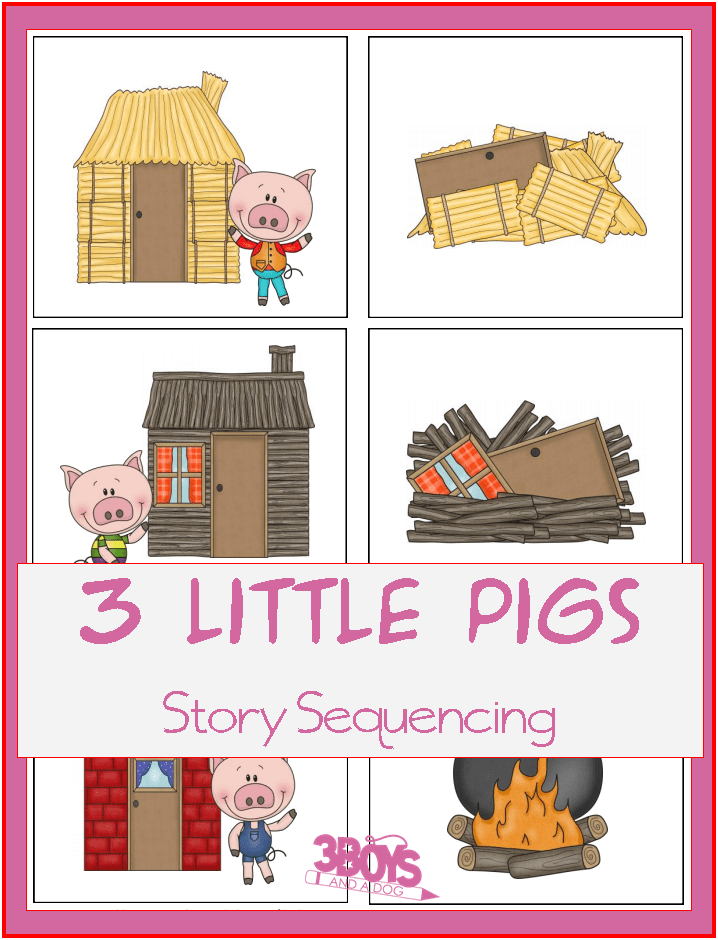 Depicting nature, the fairy tale endows animals and plants with human traits. The structure of a fairy tale consists of a beginning, a main part and an ending. cliche. A characteristic feature of the fairy tale of England is its informational saturation. Often magic is replaced by concrete facts, figures, geographical names. The reader may get the impression that fairy tales - convey certain information, describe reality. Having considered characteristic features of the English and Russian folk tales, we have identified the features fairy tales related to different genres: described the structure of the construction of fairy tales, main characters.
Depicting nature, the fairy tale endows animals and plants with human traits. The structure of a fairy tale consists of a beginning, a main part and an ending. cliche. A characteristic feature of the fairy tale of England is its informational saturation. Often magic is replaced by concrete facts, figures, geographical names. The reader may get the impression that fairy tales - convey certain information, describe reality. Having considered characteristic features of the English and Russian folk tales, we have identified the features fairy tales related to different genres: described the structure of the construction of fairy tales, main characters.
In the second part of the paper, we described the similarities and differences in elements of the content and composition of fairy tales. Differences show up in the way nominations of heroes: in the English version, the pigs do not have names, but in the Russian fairy tale, on the contrary, is called by name. Composition Analysis Results English and Russian fairy tales showed similarities in the construction of fairy tales, but small differences are observed at the point of highest stress.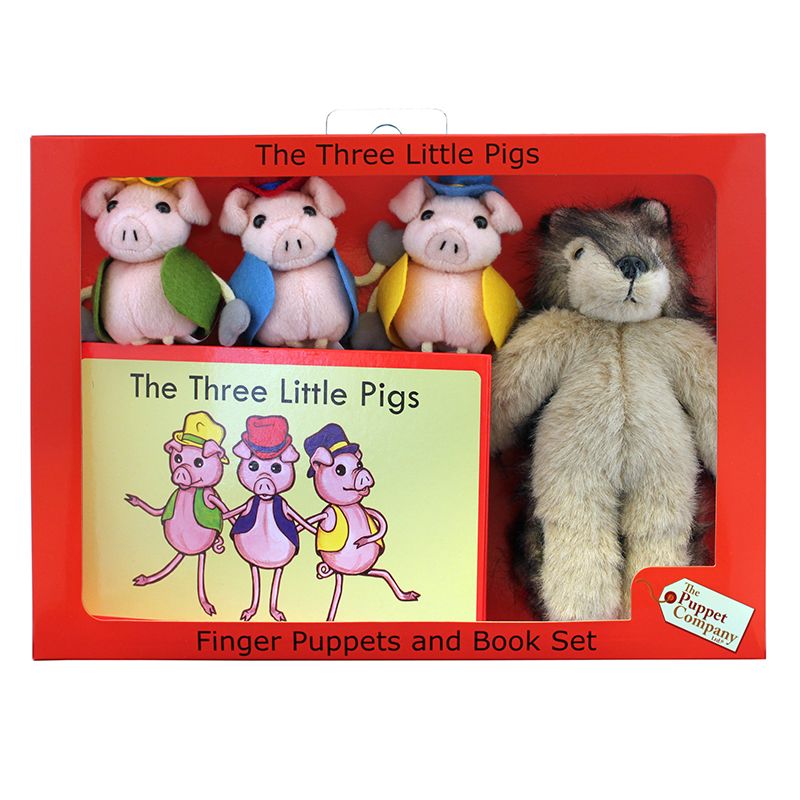 Having considered the linguistic features of fairy tales, we concluded that S.V. Mikhalkov uses a lot epithets and comparisons, repetitions, non-union. In an English fairy tale, less is used epithets and comparisons, the use of repetitions, polyunion is observed.
Having considered the linguistic features of fairy tales, we concluded that S.V. Mikhalkov uses a lot epithets and comparisons, repetitions, non-union. In an English fairy tale, less is used epithets and comparisons, the use of repetitions, polyunion is observed.
Thus, the language of the Russian fairy tale is more saturated means that attract the attention of the reader, form a vivid image of the characters, clearly describe the life of animals and their actions. Fairy tales are one of the richest and brightest forms of folk creativity. A fairy tale is a soul forever seeking truth and justice, love and happiness. people, embodied in the word. As long as humanity exists, it needs dream, and, therefore, he cannot do without a fairy tale that inspires, gives hope, amuses and comforts.
References
1. Verkhoglyad V. A English folk tales / Comp. V. A. Verkhoglyad. - M .: Iris-press, 2008. - 128 p.
2. Galperin I.R. Essays on style English: Experience of systematization of expressive means [Text] / I. R. Galperin. 2nd ed., rev. - M .: Book house "LIBROKOM", 2012. - 376 p.
R. Galperin. 2nd ed., rev. - M .: Book house "LIBROKOM", 2012. - 376 p.
3. Kostyukhin E.A. Types and forms of the animal epic. Moscow, 1987
4. Mikhalkov S.V. "Children: Poems, fairy tales, stories, fables, plays"
5. Dictionary of literary terms under. ed. S. P. Belokurova. M., 2005. [Electronic resource]. URL: http://www.gramma.ru/
6. Features of Russian folk tales [Electronic resource]. URL http://skazki.smeha.net/russkie/info.html
7. Features of Russian fairy tales. [Electronic resource]. URL: http://detskie-skazki.com/stati/osobennosti-russkih-narodnyh-skazok.html
8. Propp V.Ya. Folklore and reality // Russian folklore. Reader. M., 1965, pp. 261-264
9. Dictionaries online. http://slovari.yandex.ru
10. Ushakov D.N. Explanatory dictionary of Russian Language [Electronic resource] Access mode: Dic.academic.ru
9000
002 Appendix 1.


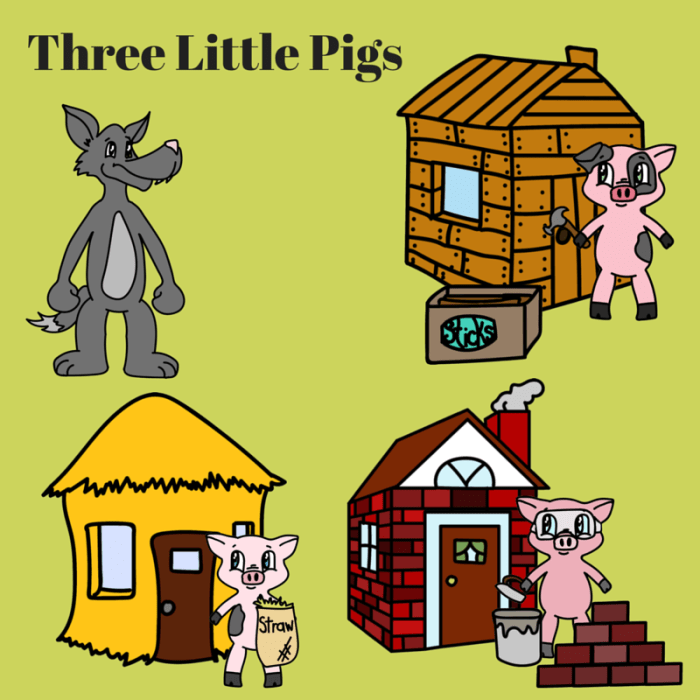
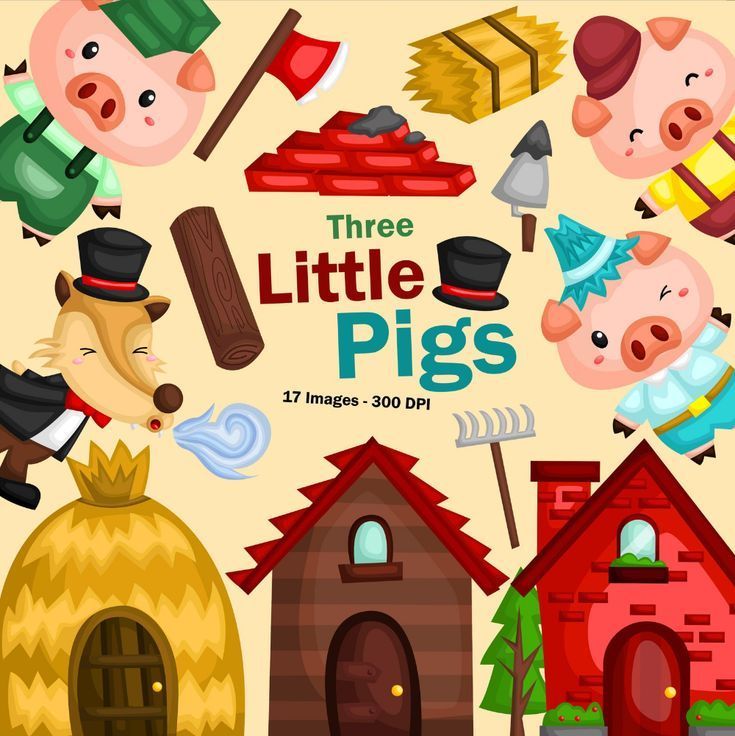
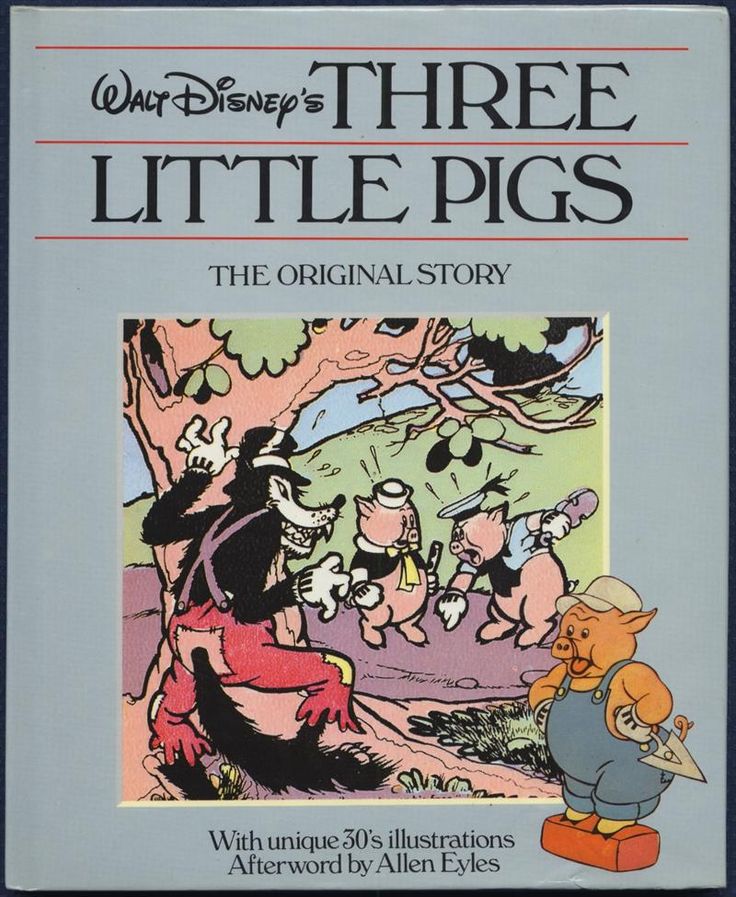
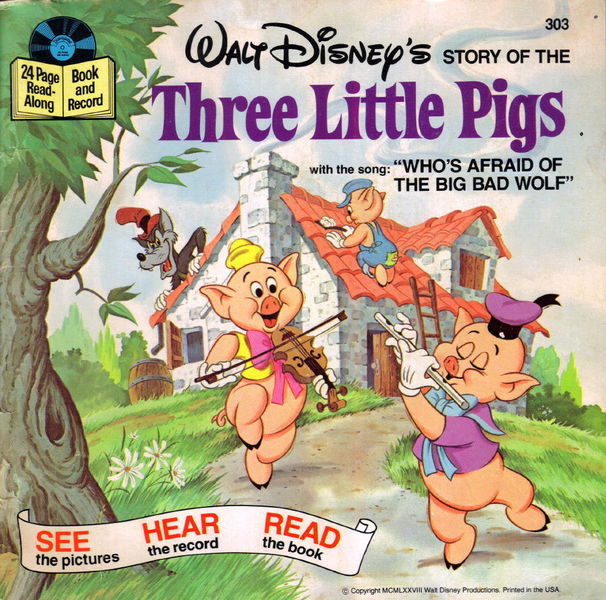
 - We are not afraid of the gray wolf,
- We are not afraid of the gray wolf, 